- Home
- Carolyn Keene
The Secret in the Old Attic Page 5
The Secret in the Old Attic Read online
Page 5
She agreed, however, that it probably would be safe for Nancy to stay, but cautioned her to be extra careful.
While the housekeeper prepared supper, Nancy hurriedly wrote a note to the publisher of “Song of the Wind.” Then she went to make Effie comfortable. The maid was feverish and declared her arm itched dreadfully. When she finally dropped off to sleep, Nancy tiptoed away to see that Susan was all right.
The little girl looked up and said, “A bad spider bit Effie. She told me all about it.”
Nancy was provoked to learn the maid had told the story to Susan, but she merely smiled. “That’s right, Susan, but only good spiders live around here. The bad one is dead now.”
To get the child’s mind off the unfortunate subject, she told her about the funny antics of the jumping spiders and the flying variety.
“Some of them are just like trapeze performers in a circus,” Nancy explained. “They spin a thread and then let the wind carry them through the air. Sometimes they go all the way from shore to a ship at sea.”
“Oh, that kind of spider would be lots of fun to watch!” Susan remarked, her fears gone now.
Hannah Gruen brought up a tray of food for the little girL Nancy decided that while Susan was eating supper, Mr. March might sit with her, and she would drive Hannah home. When they reached the Drew house, Bess and George were just leaving.
“Where in the world have you been, Nancy?” George remonstrated. “We thought something had happened to you. How about having dinner at my house and telling us about your new mystery?”
Nancy thanked her, but explained why she could not accept the invitation. Bess exclaimed in horror when she heard about the black widow episode.
“You’d better stay out of that place,” she advised.
“I’ll be careful. Don’t worry,” Nancy replied. She told the girls to climb into her car and she would drop them off.
Nancy left her friends at George’s house and went on. After stopping to buy a flashlight battery, she drove to the March estate and was in time to tuck Susan into bed. The little girl looked up at her wistfully.
“I wish you’d always stay with me,” she confided. “You’re my best friend.”
Nancy leaned down and kissed her. “I’m going to be here for a while,” she promised. “Suppose we pretend each day is a year.”
Susan liked this game, and soon she went to sleep happily. Nancy joined Mr. March on the first floor, where he was listening to the radio. As they ate supper together, he told her more about his family.
“I guess my son Fipp came by his musical ability naturally,” Mr. March said. “My mother wrote songs for the sheer joy of it. They were composed only for the family though, and never got beyond manuscript form. My son used parts of the melodies in his work. The piece called ‘Song of the Wind’ was based in part on one that my mother wrote years ago.”
Nancy pounced eagerly on this bit of information. It might prove to be good evidence in case of a lawsuit!
“What became of your mother’s old songs?” she asked quickly.
“I couldn’t say. A few of the pieces may have been put away in the attic. I’m sure Fipp didn’t have them. The old melodies had been hummed to him so many times he knew them by heart.”
The clue was sufficient to start Nancy on another intensive search. As soon as she washed the dishes, Nancy put the new battery in her flashlight and went to the attic. She began poking around in boxes. One of these was filled with interesting newspapers, some of which dated back a hundred years.
“I’m reading more than I’m working,” the young detective scolded herself with a laugh. “I’d better get on with the hunt.”
Going hurriedly through the remaining papers, Nancy came at last to the bottom of the box. Her gaze fastened upon a ribbon-tied roll of parchment.
“This may be the very thing I’m after!” she thought excitedly.
Unwrapping it, she discovered the sheet contained the music and words of a song! She hummed the first few bars. They were not familiar.
She started to investigate another box which stood nearby. As Nancy eagerly plunged her hand down, something sharp buried itself in her finger. With a sinking heart Nancy wondered if she might have been poisoned the way Effie had been!
Gingerly she pushed aside the papers, looking for a black widow spider. Then Nancy laughed as she saw what had pricked her finger. Men’s antique shoe buckles!
“What gorgeous ones!” she thought, lifting out several pairs of the old silver ornaments. They were studded with semiprecious stones, one of which had a sharp prong on it.
Nancy was happy over the find. The buckles would bring a nice sum of money for Mr. March. After wrapping them carefully in paper, she put the buckles in her pocket.
At that instant the flashlight which Nancy had laid on the floor rolled away and clicked off. As she leaned forward to pick it up, something landed with a soft thud against her hand.
Out of nowhere floated a few eerie notes of music like the faint strumming of a harp.
CHAPTER VIII
The Strange Secret
NANCY, in the pitch-black attic, kept perfectly still. She hardly breathed. Chills ran up and down her spine.
The music had ceased, but from nearby came the sounds of stealthy footsteps. These were followed by muffled rapping sounds.
“There isn’t a harp or a piano here,” Nancy told herself, trying to regain her composure. “Maybe this is just a trick to keep people out of the attic.”
The rapping had stopped now. Nancy reached again for the flashlight. This time she found it, but to her dismay it would not light.
“The store clerk must have sold me a defective battery,” Nancy said to herself, frowning.
She was too far from the stairway to get there safely in the dark among the maze of boxes and trunks.
“What am I going to do?” Nancy thought.
Suddenly she heard her name murmured. “Naa-ancy! Na-a-ancy!”
“It must be Mr. March,” she concluded as the call became louder. “Thank goodness. Now there’ll be a light.”
She stood up, then froze to the spot as a new thought struck her. If someone really were in the attic, he might harm anyone coming up the steps! Summoning all her courage, Nancy called out loudly:
“I’m in the attic. Don’t come up! Just hold a light for me at the foot of the stairs!”
Nancy had expected a hand to be clapped over her mouth, but nothing happened. In relief she called out again, saying her flashlight was not working.
A few seconds later a light shone up the stairway. Mr. March was speaking to her cheerily.
Nancy gingerly found her way across the attic. Soon she was back on the second floor. Mr. March took hold of her arm.
“You’re white as a sheet,” he said. “Something happened. What was it?”
“Did anyone touch the piano downstairs?” she asked.
“The piano? No. Why?”
“I thought I heard a few notes of music,” Nancy replied.
“You’re not telling me all you know,” the elderly man said. “I want to hear everything. Don’t keep anything back.”
“I’m afraid somebody or something is in the attic,” Nancy admitted. “After my flashlight went out there were all kinds of ghostly noises.”
Mr. March grunted. “I’ll fix him,” he said and started up the stairs. Nancy tried to hold him back.
“I’ve faced the enemy before,” he declared, holding the candle aloft. “And it’s high time I find out about that mysterious attic.”
Nancy followed him. To her chagrin they found no one, nor was there any evidence of a secret entrance through which an intruder might have come. On the floor near the spot where she had stood lay a large toy bear.
“It must have fallen from the rafters,” Nancy decided. She told Mr. March this was one of the strange events that had occurred in the past fifteen minutes. “I guess the bear fell on me,” she added.
“That bear belonged to Fipp,�
�� his father explained. “I haven’t seen it for years.”
Nancy was apologetic for having worried him. She picked up her flashlight and said no more about the incidents. But she knew that she had not imagined the stealthy footsteps, the rapping sounds, and the musical notes. Who and what had made them remained a deep mystery.
“Here’s a surprise for you,” she said, changing the subject. “I located one of the old songs under a pile of newspapers.”
Mr. March scanned the parchment eagerly. Finally he spoke. “Oh, yes, I remember this—‘The Old and the New.’ ” He nodded, humming a few bars of the tune. “My mother composed the tune and Fipp later added to it. It was one of his finest.”
“It’s the best find we’ve made yet,” said Nancy after they had gone downstairs. “If Ben Banks has published a song with this melody, you’ll certainly have a case against him.”
“I hope you receive a reply to your letter very soon,” the elderly man said. He sighed, adding, “This suspense is rather hard on an old fellow like me.”
Nancy spoke a few words of encouragement and showed him the valuable old shoe buckles. Then she said good night. That weekend she was kept busy with the housework, and had no chance to go to the attic. But she took time on Saturday to run into the business section of River Heights to see Mr. Faber.
The dealer gave her a good price for the buckles. Mr. March was overjoyed at the encouraging news.
“How wonderful!” he exclaimed. “Oh, Nancy, I’ll never be able to repay you for your kindness.”
Nancy brushed aside the comment modestly. She knew that the money she had been able to acquire was still not sufficient to take care of Susan or the house expenses indefinitely.
By Monday Effie was able to assume the duties of the household once more, and Nancy returned to her own home. Mr. Drew greeted her cheerily.
“Well, I’m glad to see my daughter again,” he said affectionately. “I believe I should take the day off and celebrate.”
Knowing she was being teased, Nancy asked, “Are you taking a holiday?”
“I’m on my way to see Mr. Booker,” her father replied.
Nancy queried him about what progress he had made in clearing up the mystery of the stolen formula for creating the lovely silk material.
“Absolutely none,” Mr. Drew confessed. “Men have been shadowing the Dight plant ever since you were there, but they haven’t seen Bushy Trott go in or come out of the building.”
“Maybe he lives there. Would you like me to go back to the factory and find out?” Nancy asked.
“Not yet, but I may call on you later. Mr. Booker is so sure his process is being imitated that whether or not Trott is there, he wants me to start suit against Lawrence Dight.”
“Will you do it?”
“Not until I have a little more evidence,” the lawyer replied. “One has to be mighty careful when accusing a person of Mr. Dight’s standing. Up to now Mr. Booker hasn’t explained much about how he makes the special silk material, so I’m on my way to find out. Want to go with me?”
“You won’t have to ask twice!”
“Then we’ll be on our way. Later, if one of us gets into the secret section of the Dight plant, we’ll be able to compare the two methods.”
Nancy and her father were welcomed cordially by Mr. Booker, who was eager to conduct the Drews through his plant.
“First I’ll show you the Gossamer Garment Room,” he declared, leading the way.
The Gossamer Room contained several bolts of filmy white silk material like that used in the scarves Nancy had seen. Others were in various colors, while a few were patterned with artistic and unusual designs.
“They’re beautiful!” Nancy exclaimed.
Clever designers had fashioned some of the materials into attractive dresses, which hung row upon row in dustproof glass cases.
“I’ve never seen anything so lovely!” Nancy said. A pale-yellow evening gown caught her eye. “What a stunning dance dress!”
In texture it was unlike anything she had ever seen before. “The material is strong,” she said, “yet it looks delicate enough to dissolve at a touch of the hand!”
“That’s why we call it gossamer,” Mr. Booker said proudly. “I’ll show you how it’s made. You must promise, of course, never to reveal my secrets!”
“You can trust us!” said Mr. Drew.
The factory owner unlocked a heavy metal door and led his callers into a room where two men sat at tables, engaged in a most unusual occupation.
“This is my spidery,” Mr. Booker explained. “Here I breed orb weavers under glass. They provide me with the silk threads I need for my material.”
“You actually use spiders!” Nancy gasped.
“Yes.” Mr. Booker smiled. “They are very useful to man when one understands how to put them to work.”
Nancy watched curiously. One of the men was holding a spider in a pair of forceps. The little insect was exuding a filmy thread from its spinneret. With his other hand the man was winding the silk onto a spool.
“The spiders work fast,” Mr. Drew remarked.
“One of them can spin a web half a yard across in less than an hour,” Mr. Booker revealed. “Now I’ll show you how we make the thread strong enough to be woven into cloth.”
Nancy and her father were escorted to the room where the secret chemical formula was mixed. Not only did Nancy look at the solution in the various tubes, but she took particular note of the peculiar scent it produced.
“I’d be more likely to recognize the odor than anything else. If this chemical is being used at the Dight factory, maybe I can identify it that way,” Nancy thought.
Mr. Drew inquired if this was the department where Bushy Trott had worked.
“Yes,” Mr. Booker replied, “he was in this section. He came to me highly recommended as a chemist. Because he left my employ abruptly, I suspect that he was sent here as a spy.”
Mr. Drew told the manufacturer there was plenty of evidence now against the rival concern.
“We’re still trying to check on Bushy Trott,” he said. “The next step will be to find out how Lawrence Dight is making his silk material’
“If only I could get into his factory again!” Nancy remarked to her father as they drove away from the Booker plant.
“Couldn’t you arrange for another trip with your friend Diane?”
“She’s scarcely a friend, Dad. But I’ll think up a way,” Nancy promised.
After dropping her father at his office, she had an inspiration. If her scheme worked, she would get into the factory!
On impulse she drove directly to the Dight home to put her plan into action. The spacious grounds were located at the edge of the city and were screened from the road by a high, ivy-covered fence. Nancy turned into the winding driveway and coasted to the big white house.
CHAPTER IX
A Blue Bottle
HOPEFULLY Nancy rang the bell at the Dight house. She was eager to carry out her plan. Diane opened the door.
“Have you come to see me?” Diane inquired curtly.
Nancy smiled graciously and replied, “You have a little sister, I believe.”
“Jean’s seven.”
“Then she’s only a little bigger than a girl I know who has very few clothes. Do you suppose your mother would be willing to pass on a few of Jean’s clothes that she has outgrown?” Nancy asked.
“I’ll ask her,” Diane offered with a shrug. “Come in.”
The invitation delighted Nancy. This was her chance to see what kind of art objects the Dights favored. Perhaps they would be interested in buying some of Mr. March’s antiques. If she could obtain something to sell them, she might have a reason for calling on Mr. Dight at his office.
Left alone, Nancy gazed with interest about the luxuriously furnished living room. Against one wall stood a mahogany case with glass shelves. On them was an array of beautiful, unusual old bottles.
“The very thing!” Nancy thought in d
elight.
She went over to examine the collection. One had the face of George Washington etched in it, another that of Dolly Madison. As Nancy stood gazing at a lovely old blue perfume bottle, Diane came downstairs.
“There you are,” she said, tossing a heap of garments onto a sofa. “Mother says to take them all if you like.”
Nancy thanked her for the clothing, and then expressed interest in the bottle collection.
“Oh, that’s Mother’s hobby,” Diane replied indifferently. “She spends a great deal of her time at antique stores trying to pick up bargains. She’d rather have an old bottle than something new.”
“Many old things are far prettier than new ones,” Nancy remarked.
“I don’t think so. And especially bottles. Anyway, it’s my opinion one collector in the family is enough.”
Nancy was tempted to make a retort, but wisely kept still. Diane certainly was a disrespectful and conceited daughter.
“Thank you for the dresses,” she said, gathering them up. “Little Susan will be delighted to have them.”
From the Dight home Nancy drove directly to Pleasant Hedges. She had seen some old bottles in the attic there!
Nancy showed Mr. March the dresses she had obtained for Susan. They were very pretty, and gave no evidence of having been worn.
“Mrs. Dight was good to send my granddaughter such fine clothes,” he said gratefully, “but I can’t accept charity.”
“That isn’t necessary.”
“You mean there’s some way I can show my appreciation?” he asked.
“In your attic are several nice old bottles. They’re standing way back under the eaves,” Nancy told him. “Mrs. Dight collects bottles. I’ll see that she gets one, if you like, in return for these dresses.”
“Do that. I remember the bottles, now that you speak of them.”
“May I sell some of them?” Nancy asked.
“Yes, yes. Every penny helps. You might give the blue flowered one to Mrs. Dight.”
Excited that her scheme had worked so far, Nancy went to the attic. Though the sun was pouring in through the one small window, she had to light a candle in order to look in the far corners of the room.

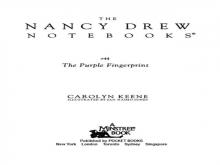 The Purple Fingerprint
The Purple Fingerprint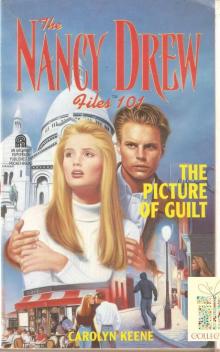 The Picture of Guilt
The Picture of Guilt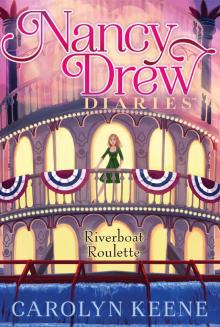 Riverboat Roulette
Riverboat Roulette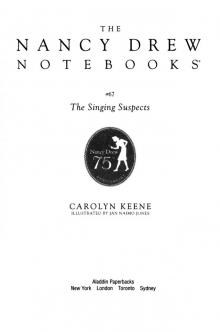 The Singing Suspects
The Singing Suspects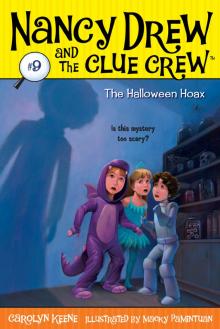 The Halloween Hoax
The Halloween Hoax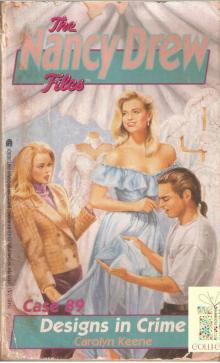 089 Designs in Crime
089 Designs in Crime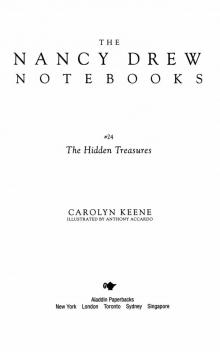 The Hidden Treasures
The Hidden Treasures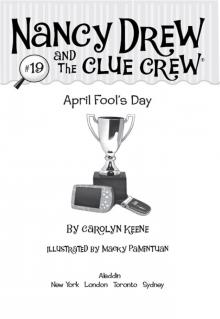 April Fool's Day
April Fool's Day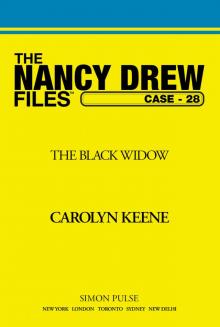 The Black Widow
The Black Widow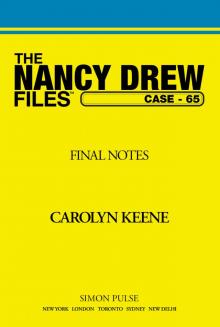 Final Notes
Final Notes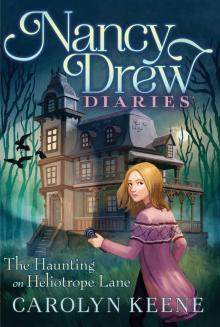 The Haunting on Heliotrope Lane
The Haunting on Heliotrope Lane The Runaway Bride
The Runaway Bride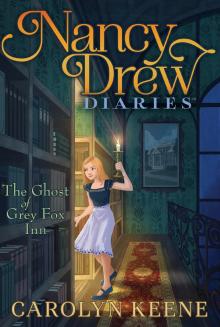 The Ghost of Grey Fox Inn
The Ghost of Grey Fox Inn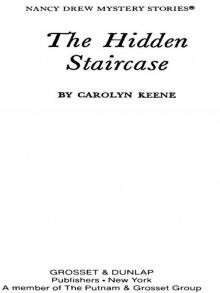 The Hidden Staircase
The Hidden Staircase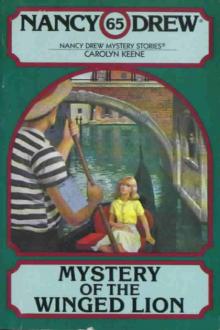 Mystery of the Winged Lion
Mystery of the Winged Lion Over the Edge
Over the Edge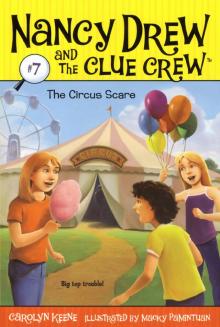 The Circus Scare
The Circus Scare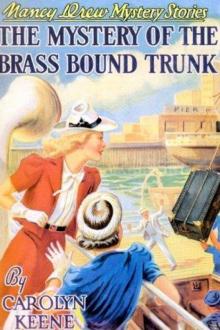 The Mystery of the Brass-Bound Trunk
The Mystery of the Brass-Bound Trunk Ski School Sneak
Ski School Sneak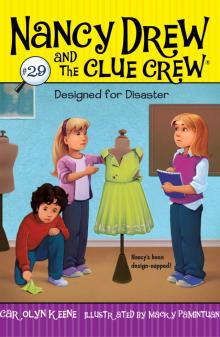 Designed for Disaster
Designed for Disaster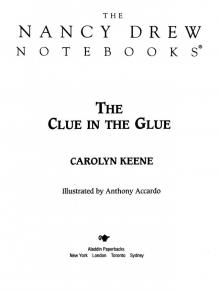 The Clue in the Glue
The Clue in the Glue Cold as Ice
Cold as Ice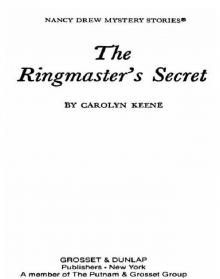 The Ringmaster's Secret
The Ringmaster's Secret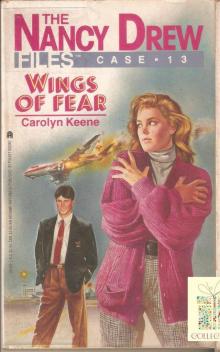 013 Wings of Fear
013 Wings of Fear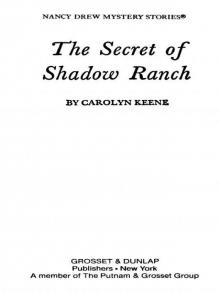 The Secret of Shadow Ranch
The Secret of Shadow Ranch Not Nice on Ice
Not Nice on Ice Earth Day Escapade
Earth Day Escapade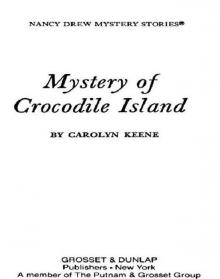 Mystery of Crocodile Island
Mystery of Crocodile Island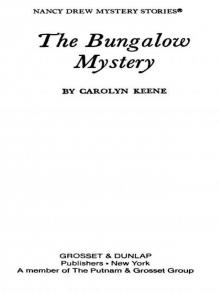 The Bungalow Mystery
The Bungalow Mystery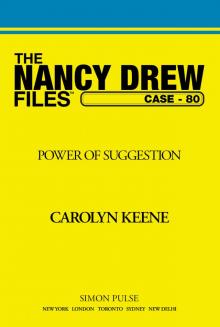 Power of Suggestion
Power of Suggestion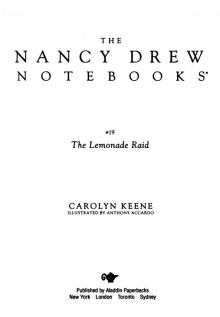 The Lemonade Raid
The Lemonade Raid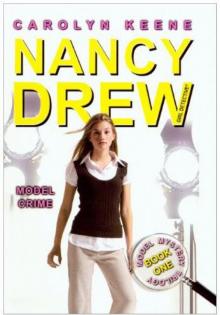 Model Crime
Model Crime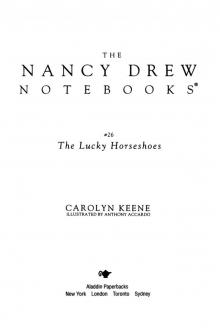 The Lucky Horseshoes
The Lucky Horseshoes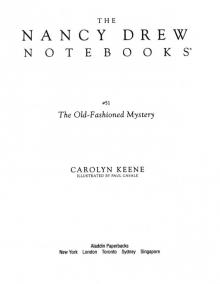 The Secret of the Old Clock
The Secret of the Old Clock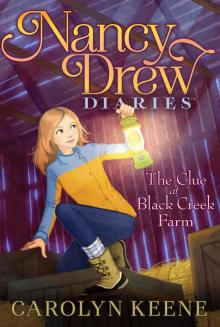 The Clue at Black Creek Farm
The Clue at Black Creek Farm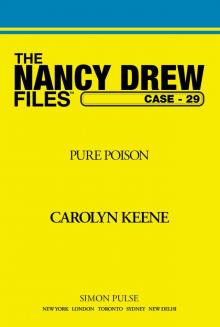 Pure Poison
Pure Poison Nobody's Business
Nobody's Business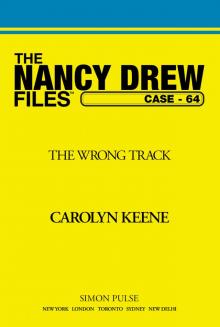 Wrong Track
Wrong Track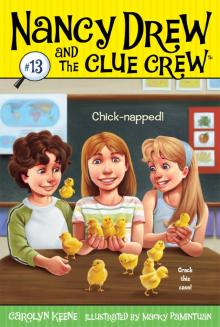 Chick-Napped!
Chick-Napped!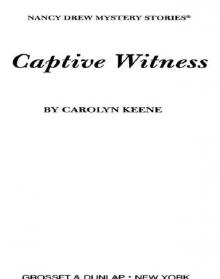 Captive Witness
Captive Witness If Looks Could Kill
If Looks Could Kill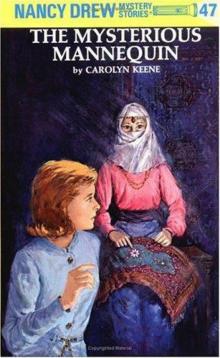 The Mysterious Mannequin
The Mysterious Mannequin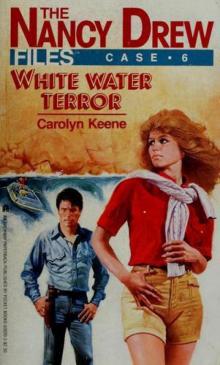 White Water Terror
White Water Terror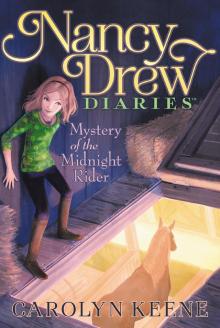 Mystery of the Midnight Rider
Mystery of the Midnight Rider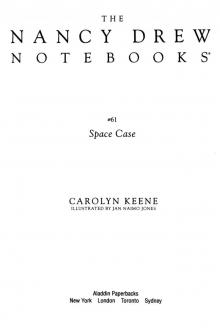 Space Case
Space Case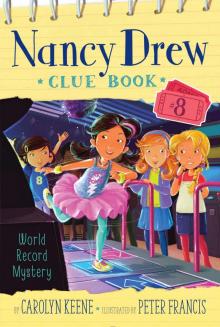 World Record Mystery
World Record Mystery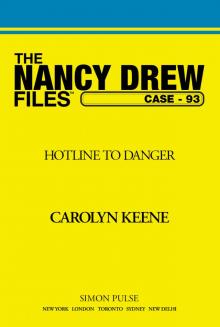 Hotline to Danger
Hotline to Danger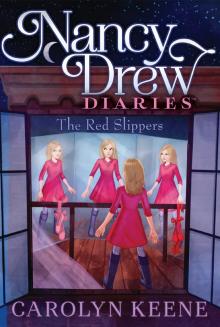 The Red Slippers
The Red Slippers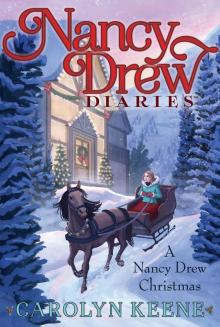 A Crime for Christmas
A Crime for Christmas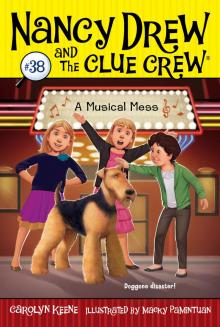 A Musical Mess
A Musical Mess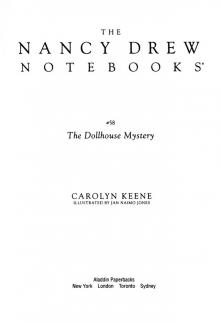 The Dollhouse Mystery
The Dollhouse Mystery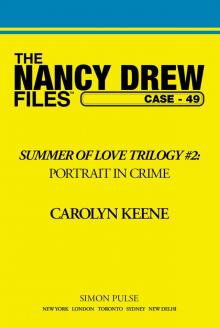 Portrait in Crime
Portrait in Crime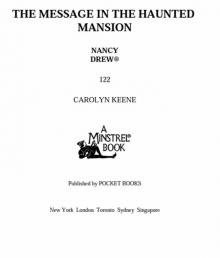 The Message in the Haunted Mansion
The Message in the Haunted Mansion Playing With Fire
Playing With Fire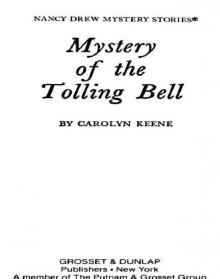 Mystery of the Tolling Bell
Mystery of the Tolling Bell Cutting Edge
Cutting Edge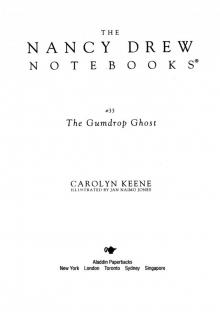 The Gumdrop Ghost
The Gumdrop Ghost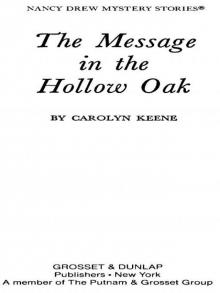 The Message in the Hollow Oak
The Message in the Hollow Oak Trial by Fire
Trial by Fire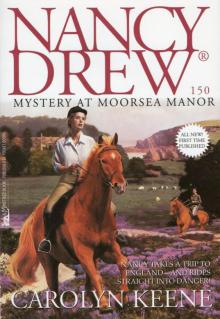 Mystery at Moorsea Manor
Mystery at Moorsea Manor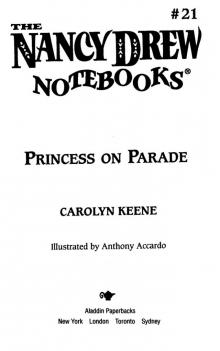 Princess on Parade
Princess on Parade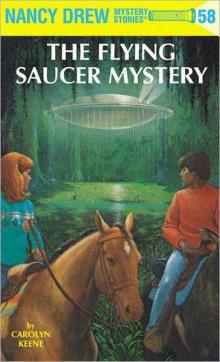 The Flying Saucer Mystery
The Flying Saucer Mystery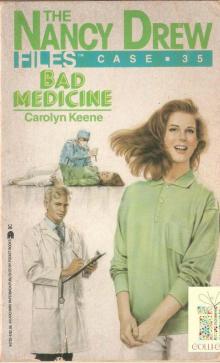 035 Bad Medicine
035 Bad Medicine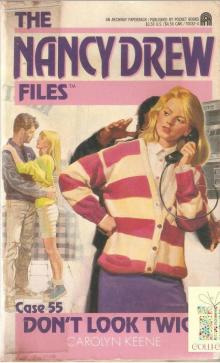 055 Don't Look Twice
055 Don't Look Twice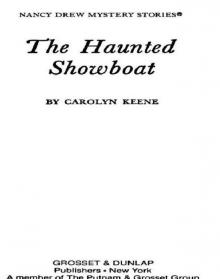 The Haunted Showboat
The Haunted Showboat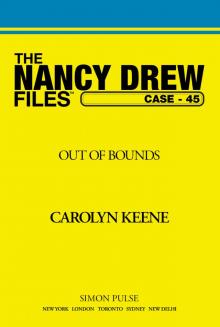 Out of Bounds
Out of Bounds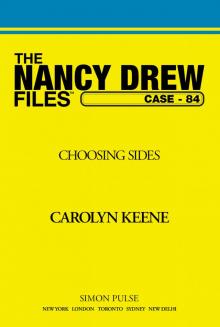 Choosing Sides
Choosing Sides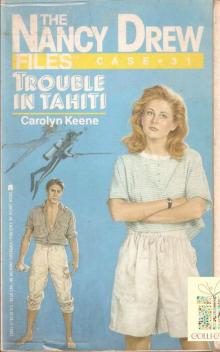 031 Trouble in Tahiti
031 Trouble in Tahiti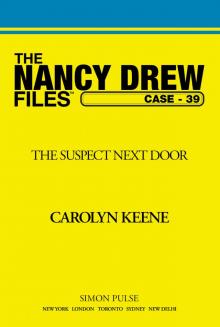 The Suspect Next Door
The Suspect Next Door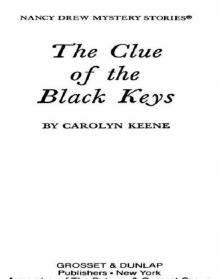 The Clue of the Black Keys
The Clue of the Black Keys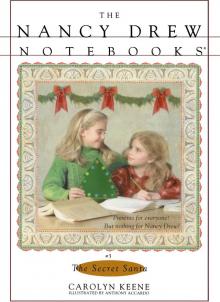 The Secret Santa
The Secret Santa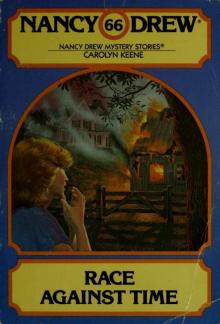 Race Against Time
Race Against Time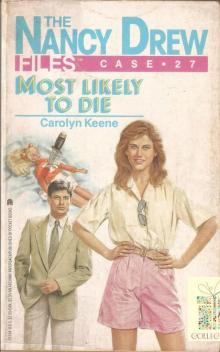 027 Most Likely to Die
027 Most Likely to Die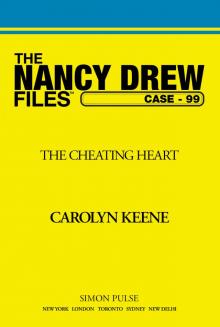 The Cheating Heart
The Cheating Heart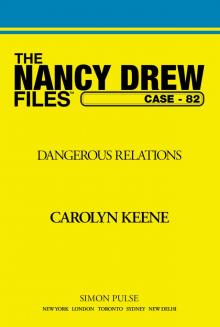 Dangerous Relations
Dangerous Relations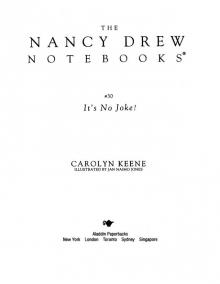 It's No Joke!
It's No Joke!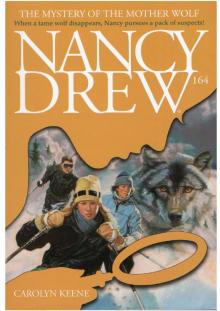 The Mystery of the Mother Wolf
The Mystery of the Mother Wolf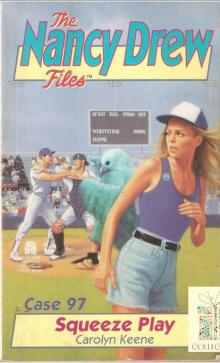 097 Squeeze Play
097 Squeeze Play Secret at Mystic Lake
Secret at Mystic Lake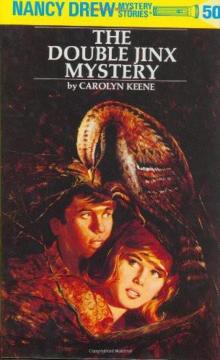 The Double Jinx Mystery
The Double Jinx Mystery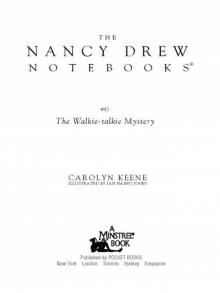 The Walkie Talkie Mystery
The Walkie Talkie Mystery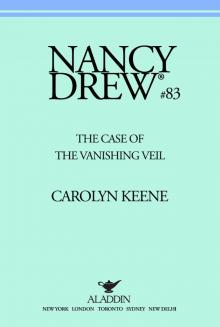 The Case of the Vanishing Veil
The Case of the Vanishing Veil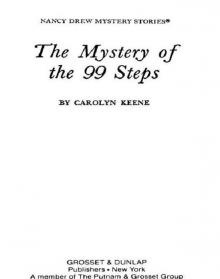 The Mystery of the 99 Steps
The Mystery of the 99 Steps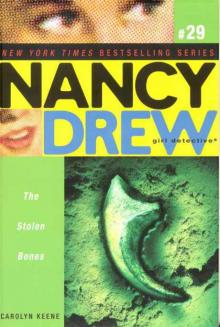 The Stolen Bones
The Stolen Bones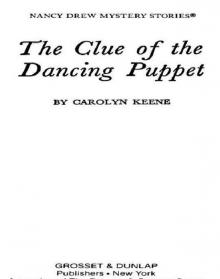 The Clue of the Dancing Puppet
The Clue of the Dancing Puppet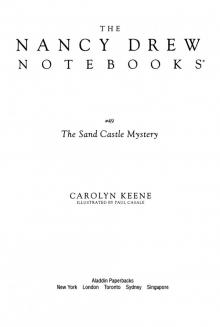 The Sand Castle Mystery
The Sand Castle Mystery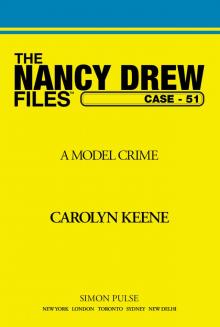 A Model Crime
A Model Crime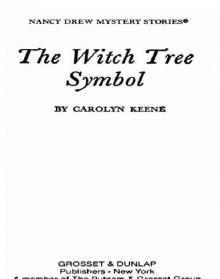 The Witch Tree Symbol
The Witch Tree Symbol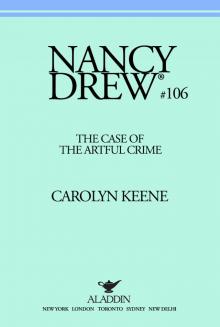 The Case of the Artful Crime
The Case of the Artful Crime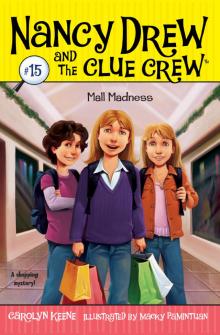 Mall Madness
Mall Madness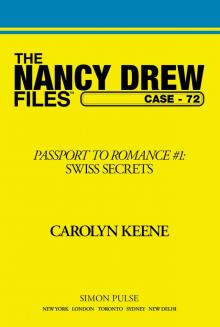 Swiss Secrets
Swiss Secrets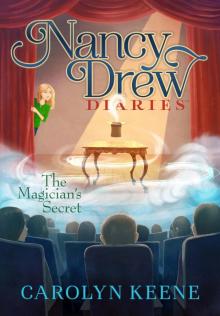 The Magician's Secret
The Magician's Secret Tall, Dark and Deadly
Tall, Dark and Deadly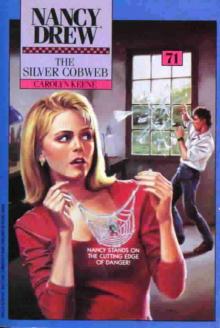 The Silver Cobweb
The Silver Cobweb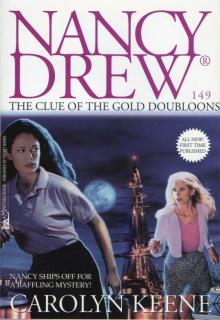 The Clue of the Gold Doubloons
The Clue of the Gold Doubloons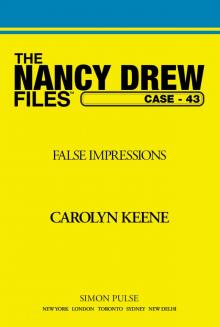 False Impressions
False Impressions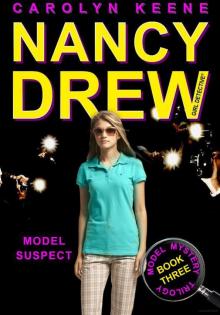 Model Suspect
Model Suspect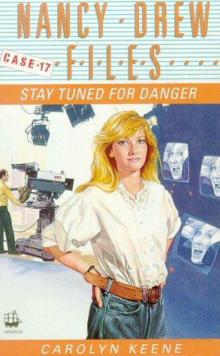 Stay Tuned for Danger
Stay Tuned for Danger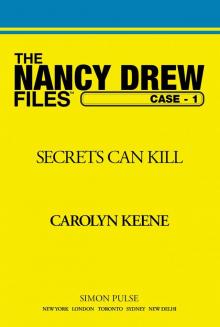 Secrets Can Kill
Secrets Can Kill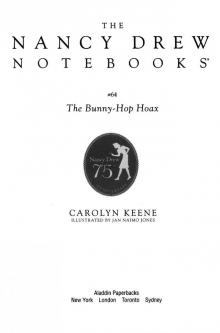 The Bunny-Hop Hoax
The Bunny-Hop Hoax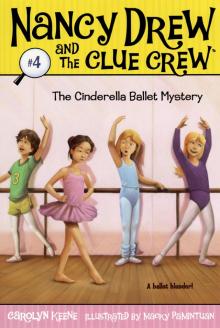 The Cinderella Ballet Mystery
The Cinderella Ballet Mystery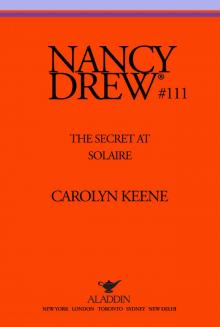 The Secret at Solaire
The Secret at Solaire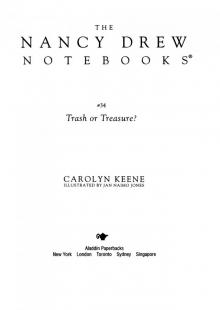 Trash or Treasure?
Trash or Treasure?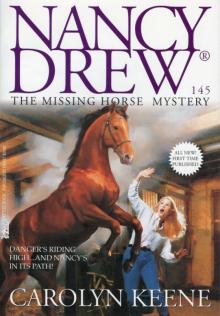 The Missing Horse Mystery
The Missing Horse Mystery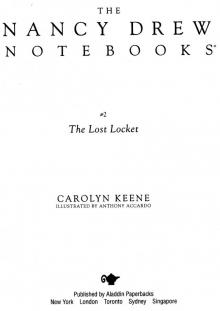 The Lost Locket
The Lost Locket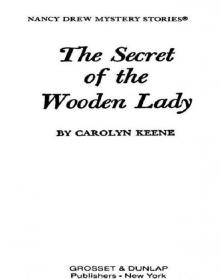 The Secret of the Wooden Lady
The Secret of the Wooden Lady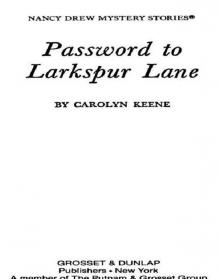 Password to Larkspur Lane
Password to Larkspur Lane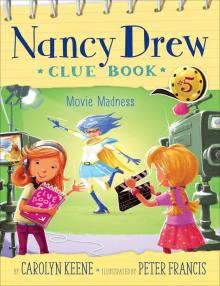 Movie Madness
Movie Madness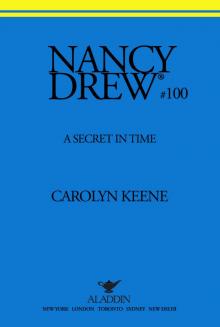 A Secret in Time
A Secret in Time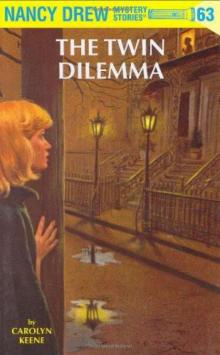 The Twin Dilemma
The Twin Dilemma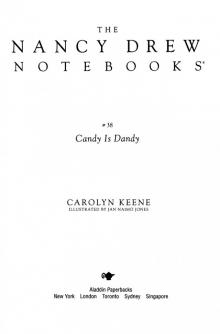 Candy Is Dandy
Candy Is Dandy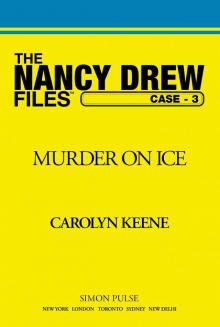 Murder on Ice
Murder on Ice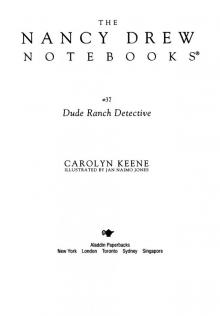 Dude Ranch Detective
Dude Ranch Detective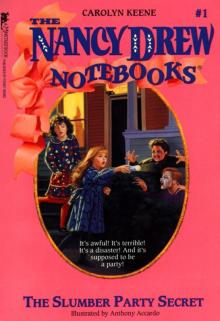 The Slumber Party Secret
The Slumber Party Secret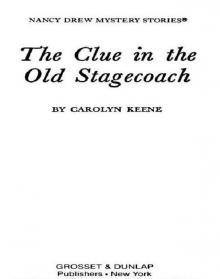 The Clue in the Old Stagecoach
The Clue in the Old Stagecoach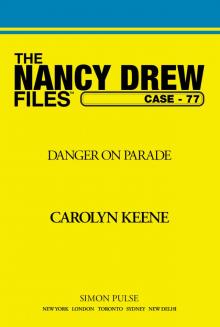 Danger on Parade
Danger on Parade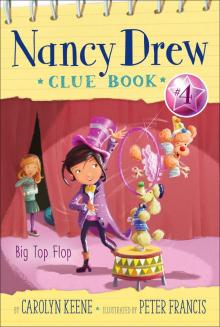 Big Top Flop
Big Top Flop Strangers on a Train
Strangers on a Train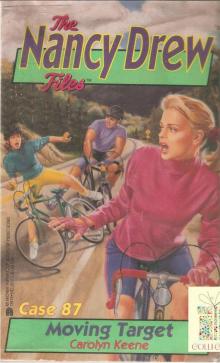 087 Moving Target
087 Moving Target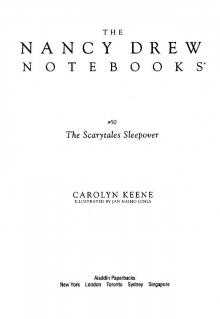 The Scarytales Sleepover
The Scarytales Sleepover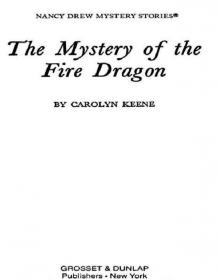 The Mystery of the Fire Dragon
The Mystery of the Fire Dragon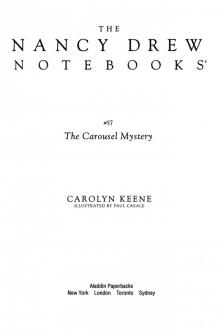 The Carousel Mystery
The Carousel Mystery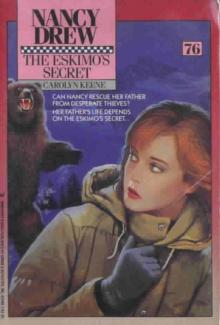 The Eskimo's Secret
The Eskimo's Secret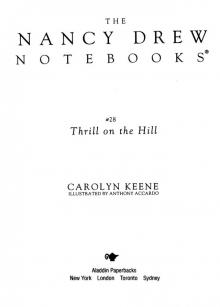 Thrill on the Hill
Thrill on the Hill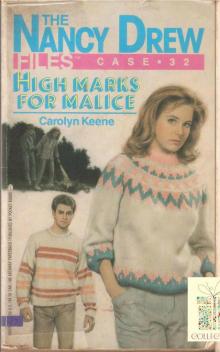 032 High Marks for Malice
032 High Marks for Malice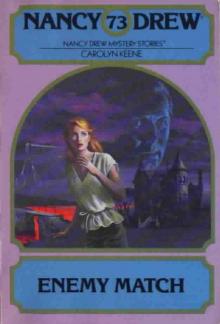 Enemy Match
Enemy Match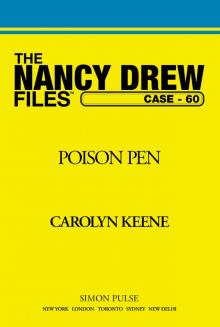 Poison Pen
Poison Pen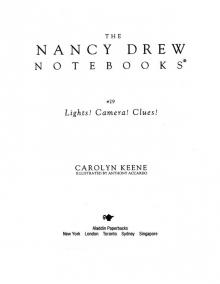 Lights, Camera . . . Cats!
Lights, Camera . . . Cats! Lost in the Everglades
Lost in the Everglades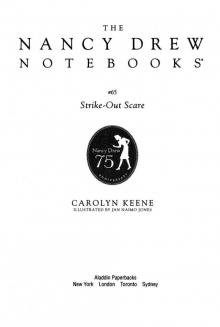 Strike-Out Scare
Strike-Out Scare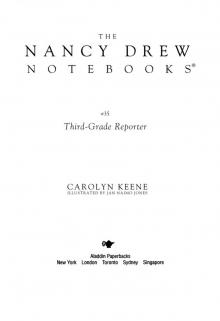 Third-Grade Reporter
Third-Grade Reporter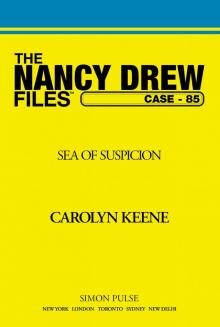 Sea of Suspicion
Sea of Suspicion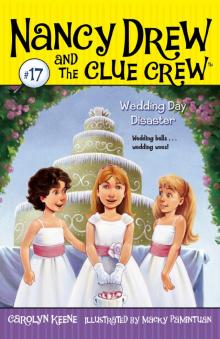 Wedding Day Disaster
Wedding Day Disaster The Make-A-Pet Mystery
The Make-A-Pet Mystery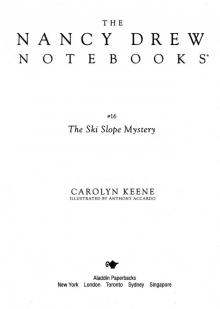 The Ski Slope Mystery
The Ski Slope Mystery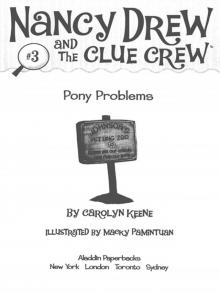 Pony Problems
Pony Problems Candy Kingdom Chaos
Candy Kingdom Chaos The Sign in the Smoke
The Sign in the Smoke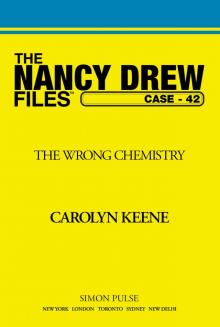 The Wrong Chemistry
The Wrong Chemistry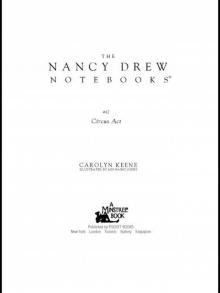 Circus Act
Circus Act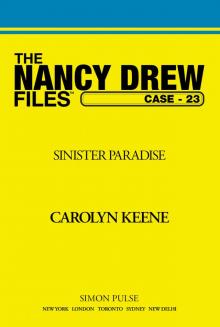 Sinister Paradise
Sinister Paradise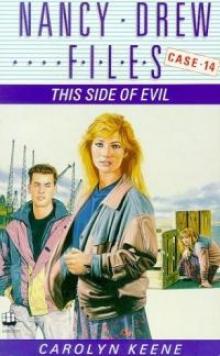 This Side of Evil
This Side of Evil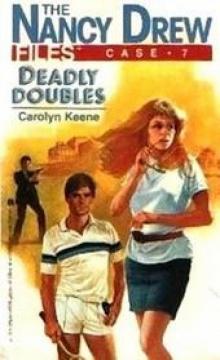 Deadly Doubles
Deadly Doubles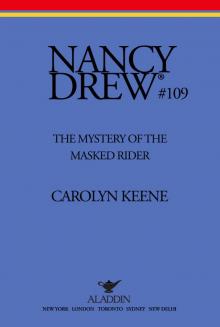 The Mystery of the Masked Rider
The Mystery of the Masked Rider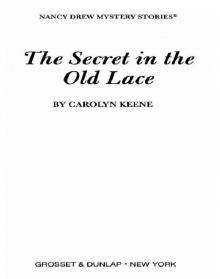 The Secret in the Old Lace
The Secret in the Old Lace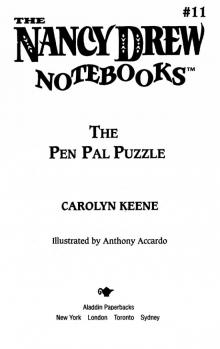 The Pen Pal Puzzle
The Pen Pal Puzzle Without a Trace
Without a Trace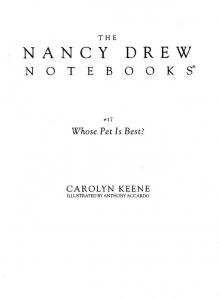 Whose Pet Is Best?
Whose Pet Is Best?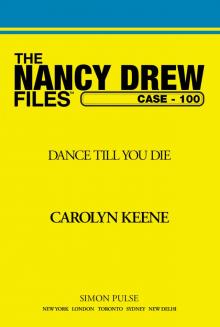 Dance Till You Die
Dance Till You Die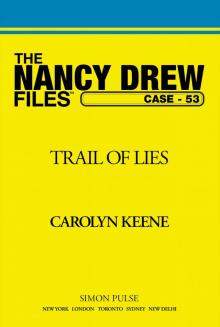 Trail of Lies
Trail of Lies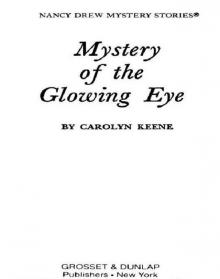 Mystery of the Glowing Eye
Mystery of the Glowing Eye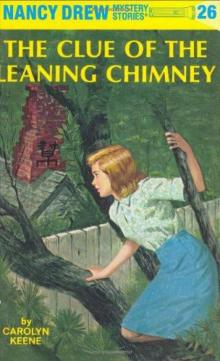 The Clue of the Leaning Chimney
The Clue of the Leaning Chimney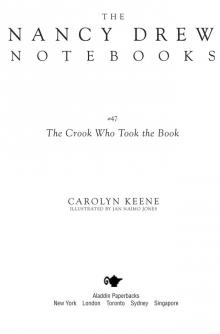 The Crook Who Took the Book
The Crook Who Took the Book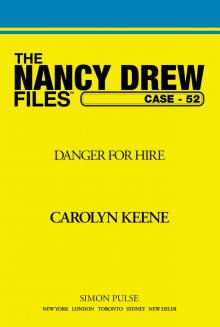 Danger for Hire
Danger for Hire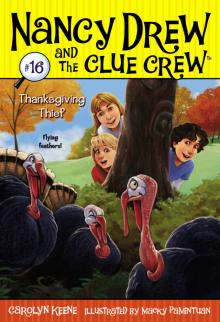 Thanksgiving Thief
Thanksgiving Thief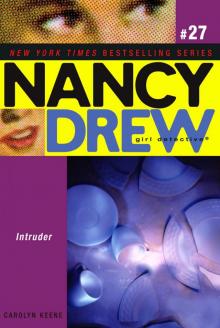 Intruder!
Intruder!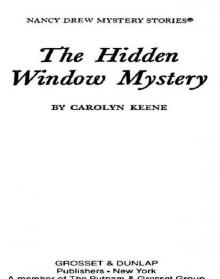 The Hidden Window Mystery
The Hidden Window Mystery Win, Place or Die
Win, Place or Die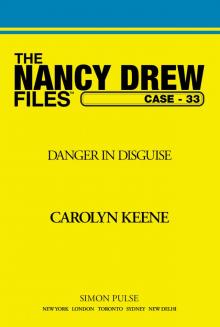 Danger in Disguise
Danger in Disguise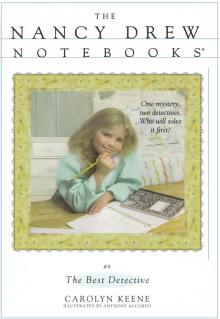 The Best Detective
The Best Detective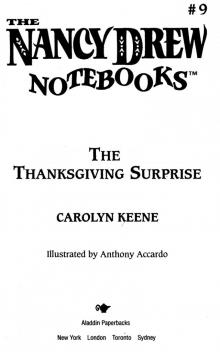 The Thanksgiving Surprise
The Thanksgiving Surprise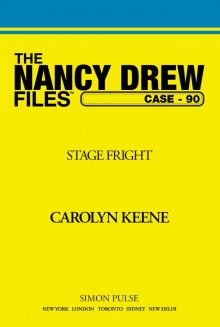 Stage Fright
Stage Fright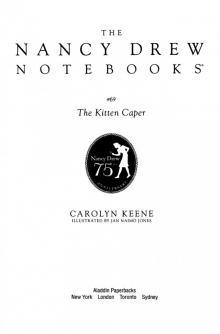 The Kitten Caper
The Kitten Caper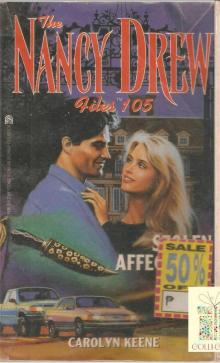 Stolen Affections
Stolen Affections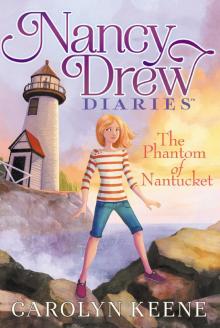 The Phantom of Nantucket
The Phantom of Nantucket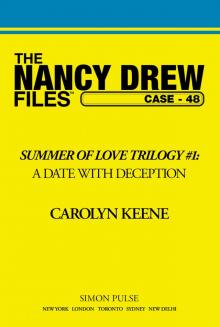 Date With Deception
Date With Deception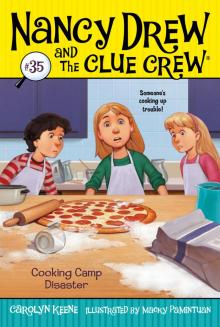 Cooking Camp Disaster
Cooking Camp Disaster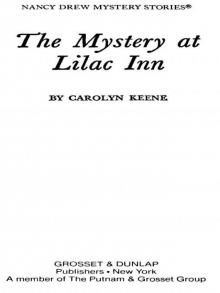 The Mystery at Lilac Inn
The Mystery at Lilac Inn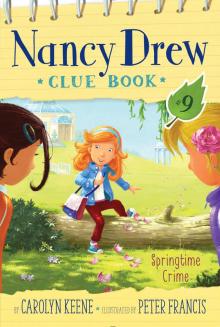 Springtime Crime
Springtime Crime Action!
Action! Into Thin Air
Into Thin Air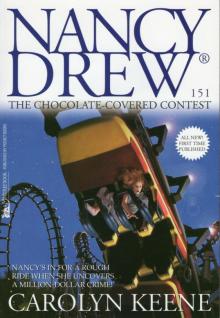 The Chocolate-Covered Contest
The Chocolate-Covered Contest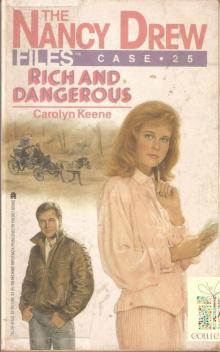 025 Rich and Dangerous
025 Rich and Dangerous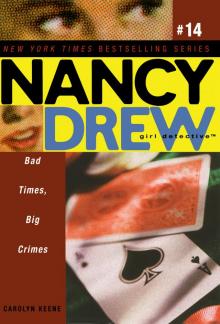 Bad Times, Big Crimes
Bad Times, Big Crimes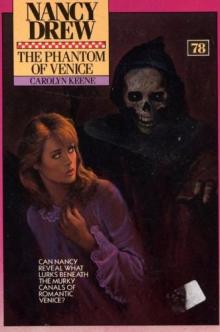 078 The Phantom Of Venice
078 The Phantom Of Venice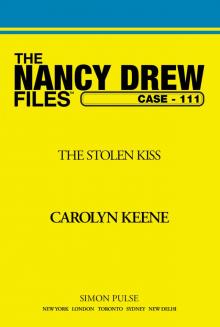 The Stolen Kiss
The Stolen Kiss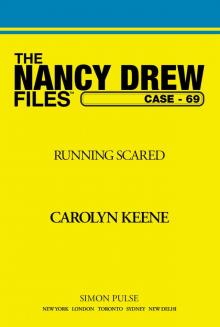 Running Scared
Running Scared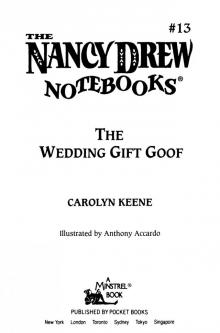 The Wedding Gift Goof
The Wedding Gift Goof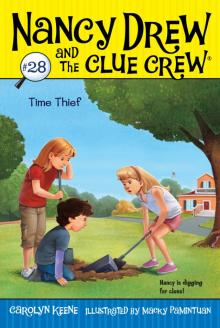 Time Thief
Time Thief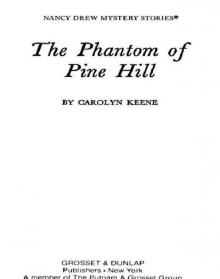 The Phantom of Pine Hill
The Phantom of Pine Hill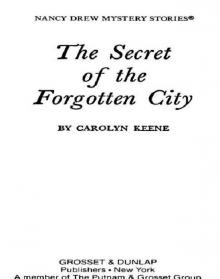 The Secret of the Forgotten City
The Secret of the Forgotten City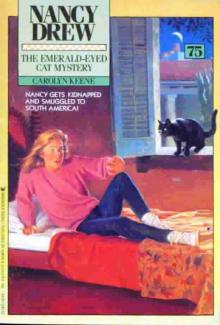 The Emerald-Eyed Cat Mystery
The Emerald-Eyed Cat Mystery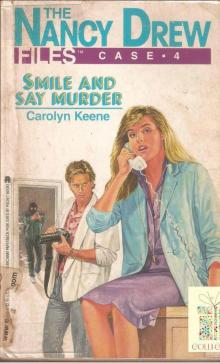 004 Smile and Say Murder
004 Smile and Say Murder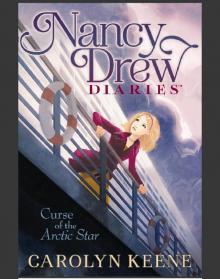 Curse of the Arctic Star
Curse of the Arctic Star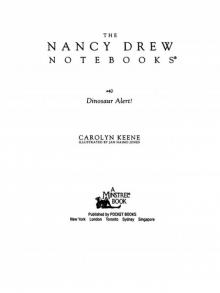 Dinosaur Alert!
Dinosaur Alert!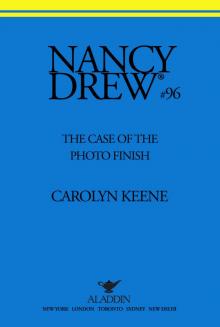 The Case of the Photo Finish
The Case of the Photo Finish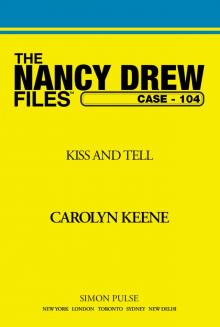 Kiss and Tell
Kiss and Tell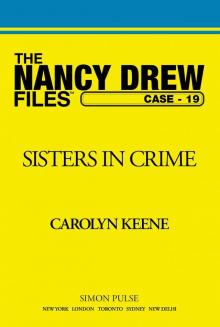 Sisters in Crime
Sisters in Crime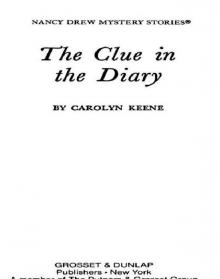 The Clue in the Diary
The Clue in the Diary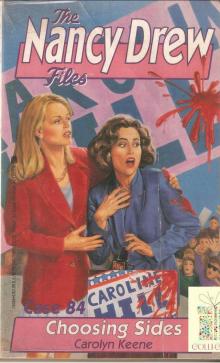 084 Choosing Sides
084 Choosing Sides Haunting of Horse Island
Haunting of Horse Island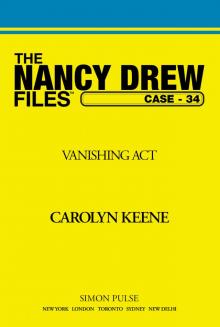 Vanishing Act
Vanishing Act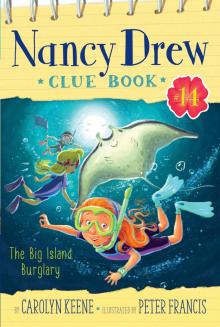 The Big Island Burglary
The Big Island Burglary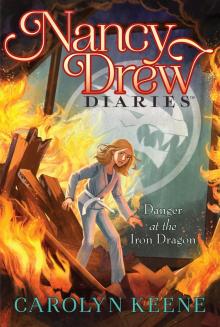 Danger at the Iron Dragon
Danger at the Iron Dragon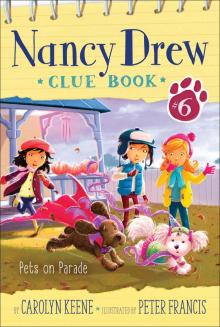 Pets on Parade
Pets on Parade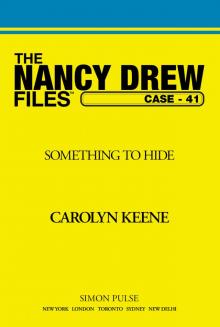 Something to Hide
Something to Hide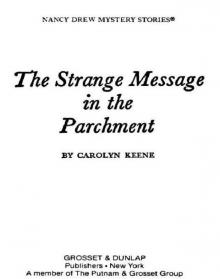 The Strange Message in the Parchment
The Strange Message in the Parchment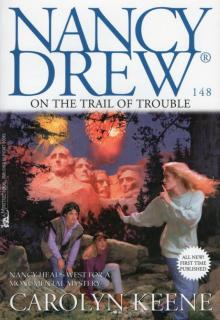 On the Trail of Trouble
On the Trail of Trouble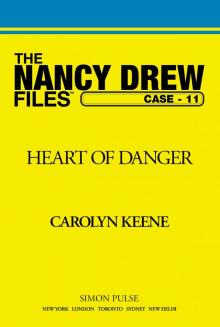 Heart of Danger
Heart of Danger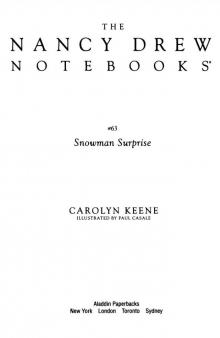 The Snowman Surprise
The Snowman Surprise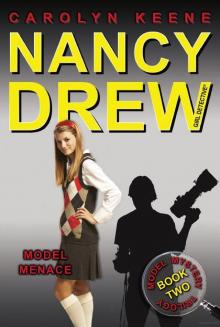 Model Menace
Model Menace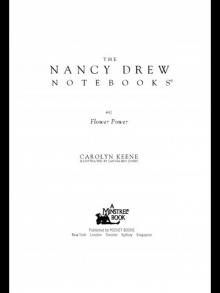 Flower Power
Flower Power The Great Goat Gaffe
The Great Goat Gaffe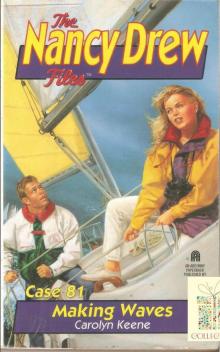 081 Making Waves
081 Making Waves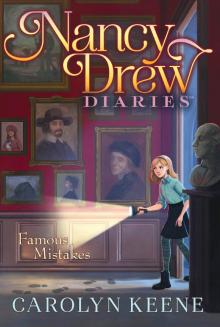 Famous Mistakes
Famous Mistakes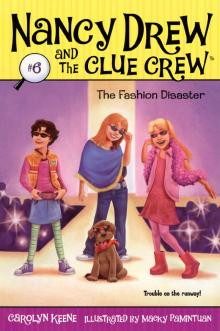 The Fashion Disaster
The Fashion Disaster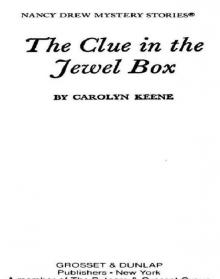 The Clue in the Jewel Box
The Clue in the Jewel Box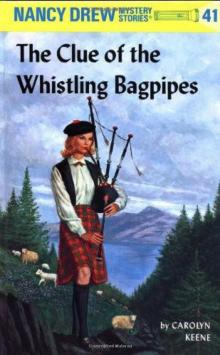 The Clue of the Whistling Bagpipes
The Clue of the Whistling Bagpipes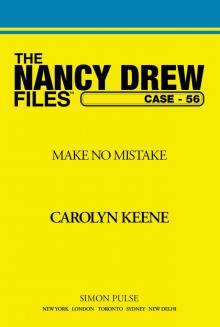 Make No Mistake
Make No Mistake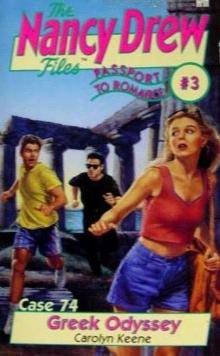 Greek Odyssey
Greek Odyssey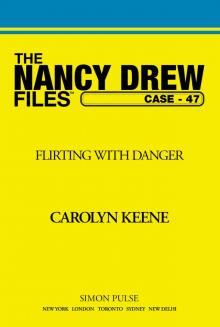 Flirting With Danger
Flirting With Danger Double Take
Double Take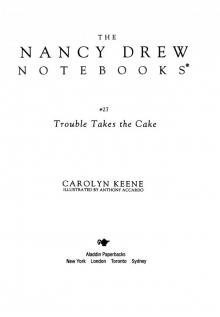 Trouble Takes the Cake
Trouble Takes the Cake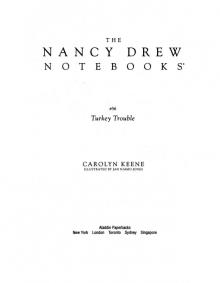 Turkey Trouble
Turkey Trouble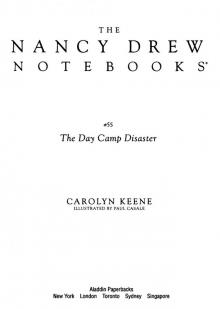 The Day Camp Disaster
The Day Camp Disaster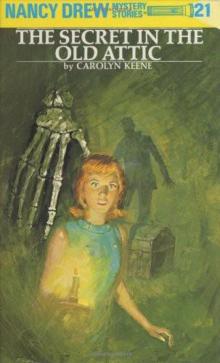 The Secret in the Old Attic
The Secret in the Old Attic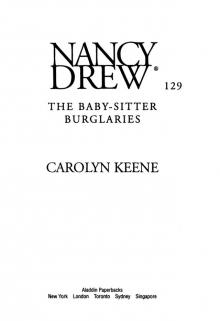 The Baby-Sitter Burglaries
The Baby-Sitter Burglaries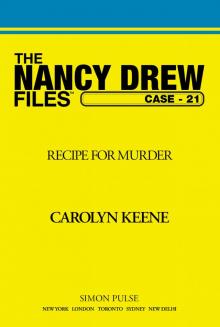 Recipe for Murder
Recipe for Murder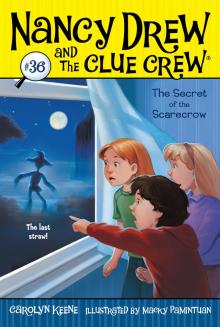 The Secret of the Scarecrow
The Secret of the Scarecrow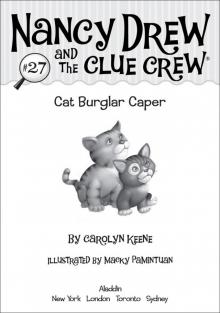 Cat Burglar Caper
Cat Burglar Caper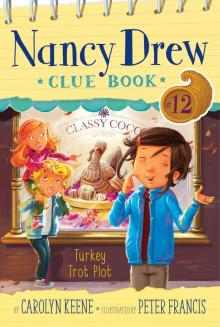 Turkey Trot Plot
Turkey Trot Plot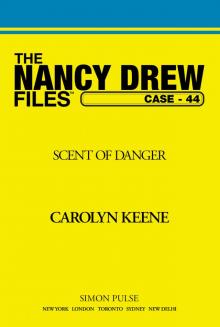 Scent of Danger
Scent of Danger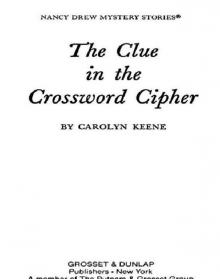 The Clue in the Crossword Cipher
The Clue in the Crossword Cipher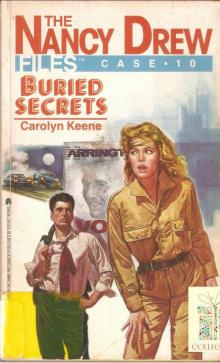 010 Buried Secrets
010 Buried Secrets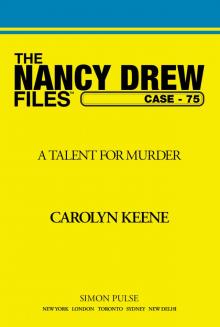 A Talent for Murder
A Talent for Murder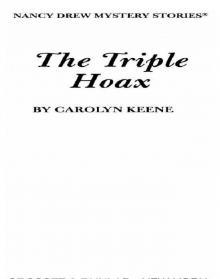 The Triple Hoax
The Triple Hoax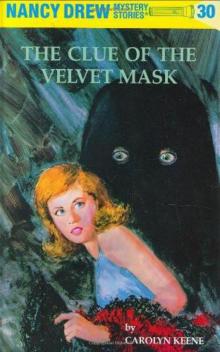 The Clue of the Velvet Mask
The Clue of the Velvet Mask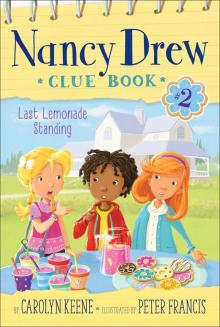 Last Lemonade Standing
Last Lemonade Standing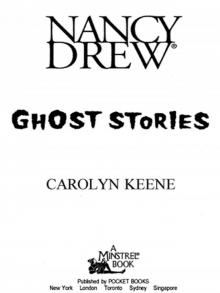 The Ghost of Blackwood Hall
The Ghost of Blackwood Hall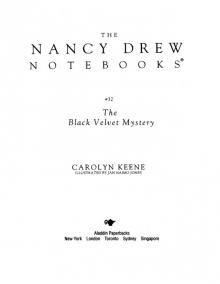 The Black Velvet Mystery
The Black Velvet Mystery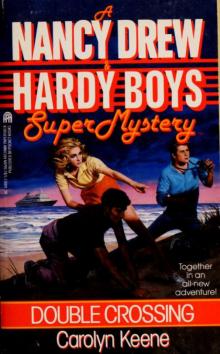 Double Crossing
Double Crossing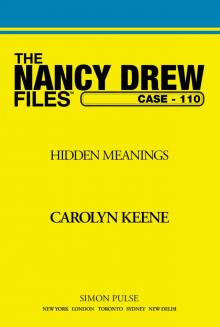 Hidden Meanings
Hidden Meanings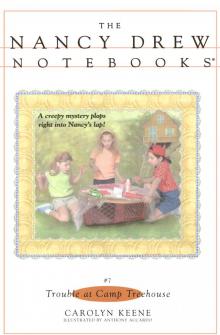 Trouble at Camp Treehouse
Trouble at Camp Treehouse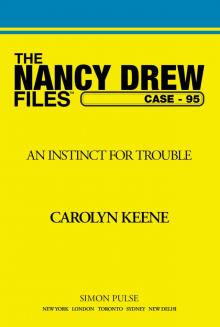 An Instinct for Trouble
An Instinct for Trouble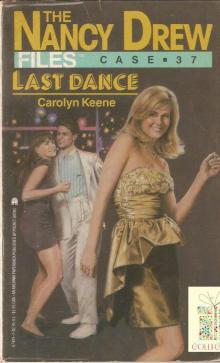 037 Last Dance
037 Last Dance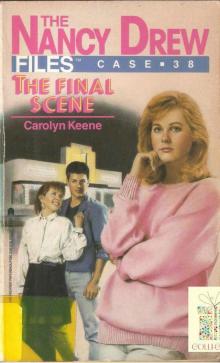 038 The Final Scene
038 The Final Scene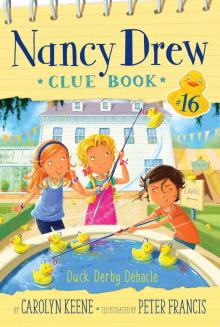 Duck Derby Debacle
Duck Derby Debacle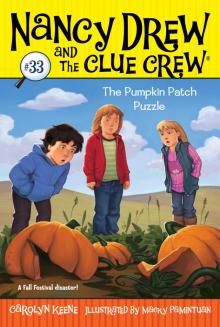 The Pumpkin Patch Puzzle
The Pumpkin Patch Puzzle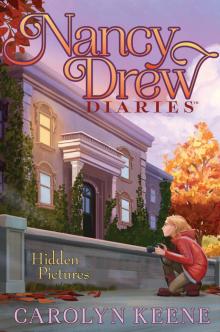 Hidden Pictures
Hidden Pictures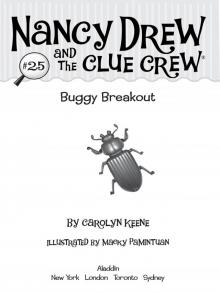 Buggy Breakout
Buggy Breakout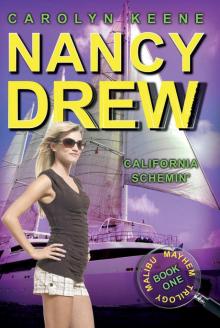 California Schemin'
California Schemin'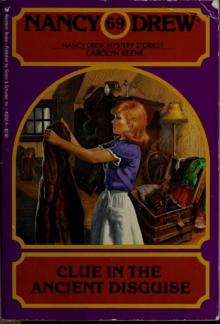 Clue in the Ancient Disguise
Clue in the Ancient Disguise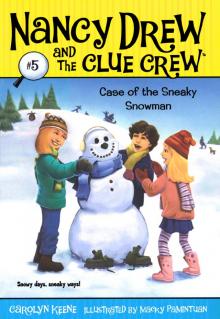 Case of the Sneaky Snowman
Case of the Sneaky Snowman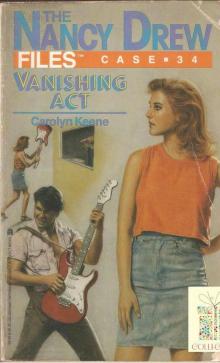 034 Vanishing Act
034 Vanishing Act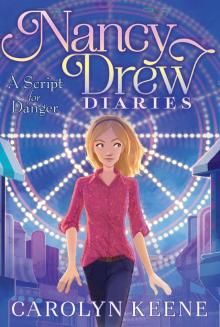 A Script for Danger
A Script for Danger The Flower Show Fiasco
The Flower Show Fiasco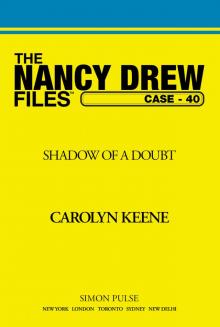 Shadow of a Doubt
Shadow of a Doubt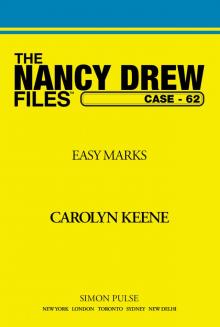 Easy Marks
Easy Marks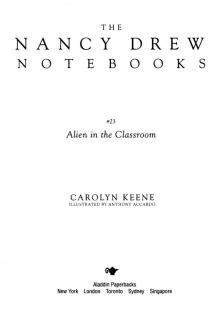 Alien in the Classroom
Alien in the Classroom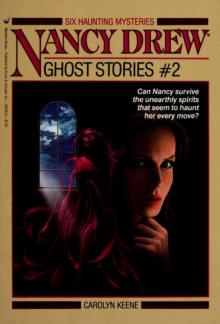 Ghost Stories, #2 (Nancy Drew)
Ghost Stories, #2 (Nancy Drew)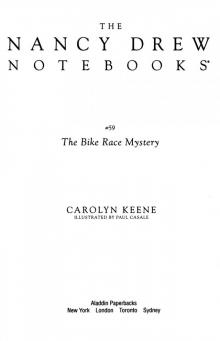 The Bike Race Mystery
The Bike Race Mystery False Pretenses
False Pretenses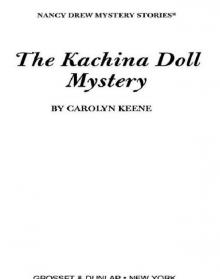 The Kachina Doll Mystery
The Kachina Doll Mystery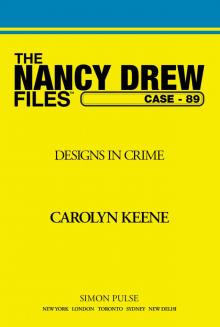 Designs in Crime
Designs in Crime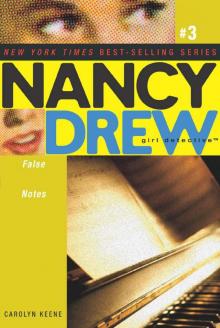 False Notes
False Notes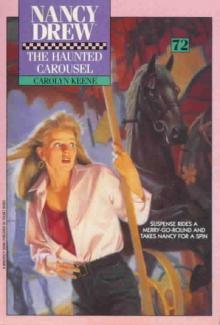 The Haunted Carousel
The Haunted Carousel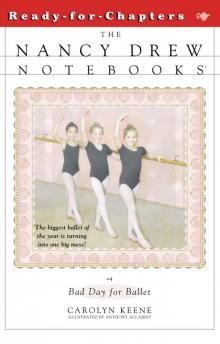 Bad Day for Ballet
Bad Day for Ballet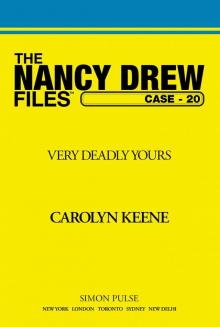 Very Deadly Yours
Very Deadly Yours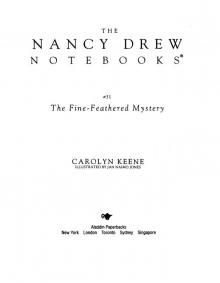 The Fine-Feathered Mystery
The Fine-Feathered Mystery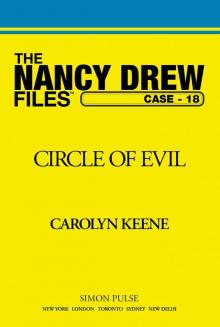 Circle of Evil
Circle of Evil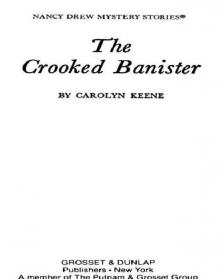 The Crooked Banister
The Crooked Banister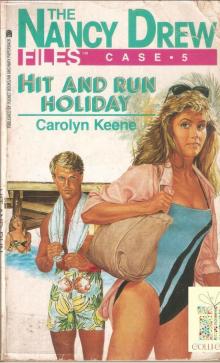 005 Hit and Run Holiday
005 Hit and Run Holiday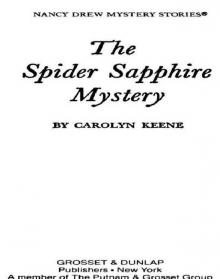 The Spider Sapphire Mystery
The Spider Sapphire Mystery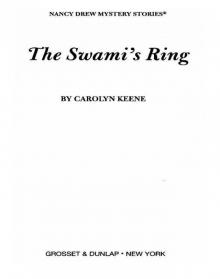 The Swami's Ring
The Swami's Ring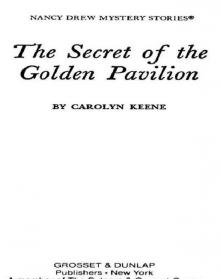 The Secret of the Golden Pavilion
The Secret of the Golden Pavilion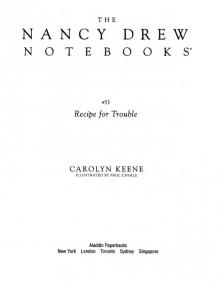 Recipe for Trouble
Recipe for Trouble Betrayed by Love
Betrayed by Love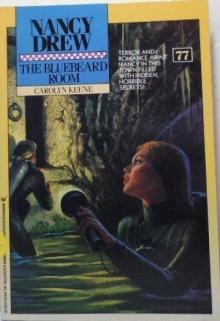 The Bluebeard Room
The Bluebeard Room Sweet Revenge
Sweet Revenge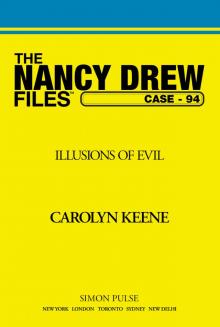 Illusions of Evil
Illusions of Evil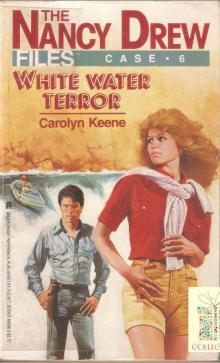 006 White Water Terror
006 White Water Terror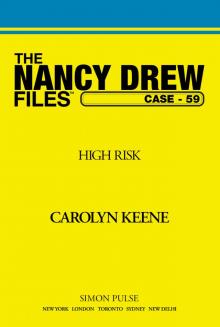 High Risk
High Risk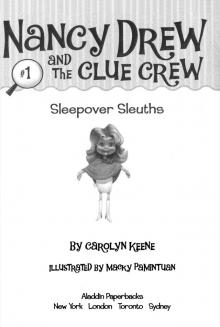 Sleepover Sleuths
Sleepover Sleuths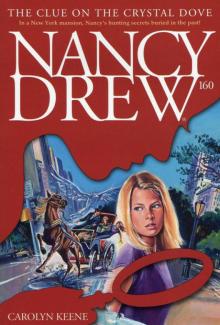 The Clue on the Crystal Dove
The Clue on the Crystal Dove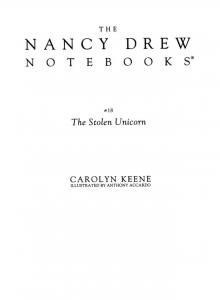 The Stolen Unicorn
The Stolen Unicorn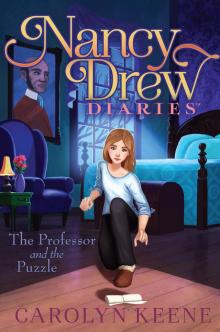 The Professor and the Puzzle
The Professor and the Puzzle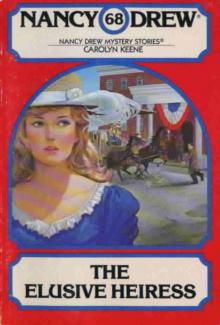 The Elusive Heiress
The Elusive Heiress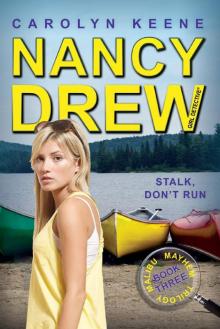 Stalk, Don't Run
Stalk, Don't Run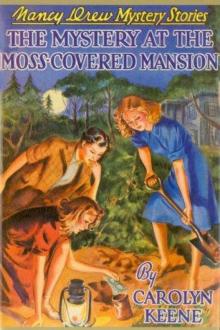 The Mystery at the Moss-Covered Mansion
The Mystery at the Moss-Covered Mansion The Tortoise and the Scare
The Tortoise and the Scare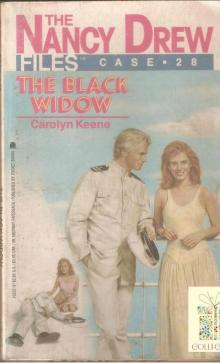 028 The Black Widow
028 The Black Widow Big Worry in Wonderland
Big Worry in Wonderland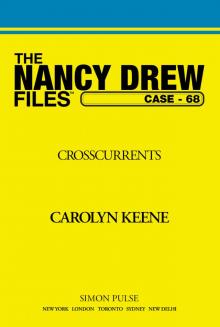 Crosscurrents
Crosscurrents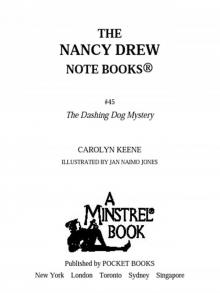 The Dashing Dog Mystery
The Dashing Dog Mystery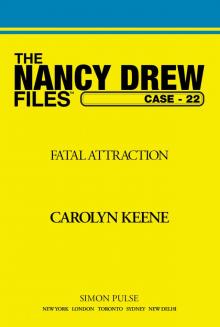 Fatal Attraction
Fatal Attraction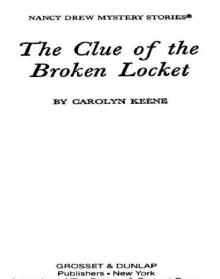 The Clue of the Broken Locket
The Clue of the Broken Locket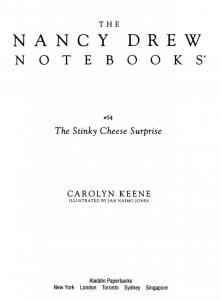 The Stinky Cheese Surprise
The Stinky Cheese Surprise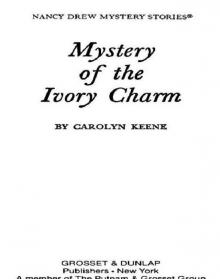 Mystery of the Ivory Charm
Mystery of the Ivory Charm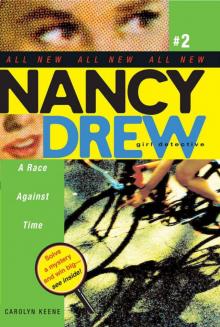 A Race Against Time
A Race Against Time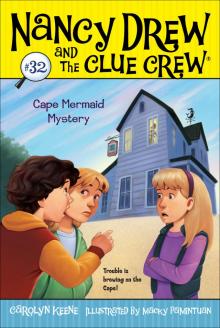 Cape Mermaid Mystery
Cape Mermaid Mystery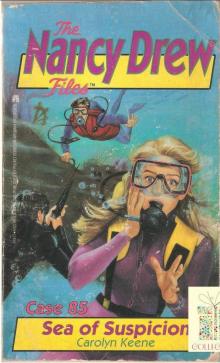 085 Sea of Suspicion
085 Sea of Suspicion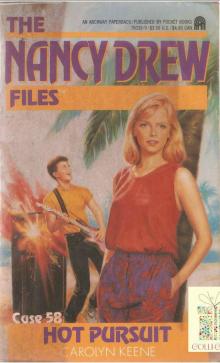 058 Hot Pursuit
058 Hot Pursuit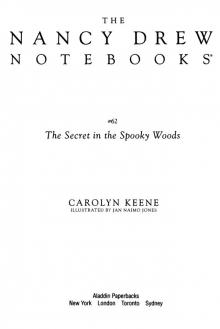 The Secret in the Spooky Woods
The Secret in the Spooky Woods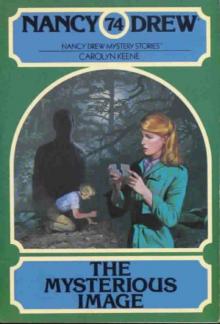 The Mysterious Image
The Mysterious Image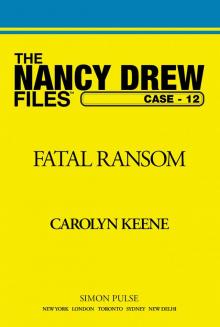 Fatal Ransom
Fatal Ransom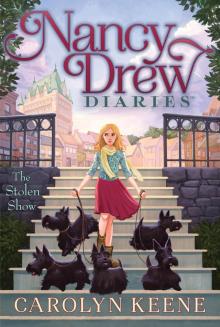 The Stolen Show
The Stolen Show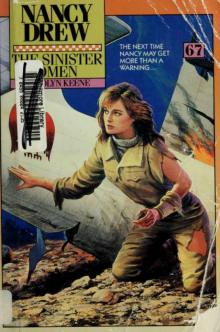 The Sinister Omen
The Sinister Omen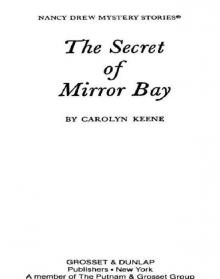 The Secret of Mirror Bay
The Secret of Mirror Bay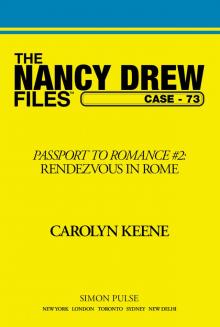 Rendezvous in Rome
Rendezvous in Rome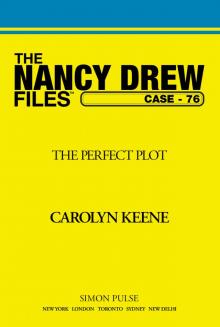 The Perfect Plot
The Perfect Plot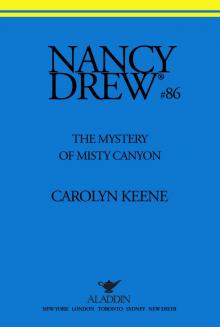 The Mystery of Misty Canyon
The Mystery of Misty Canyon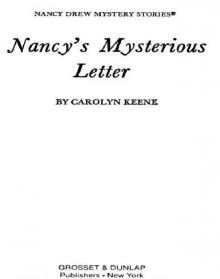 Nancy's Mysterious Letter
Nancy's Mysterious Letter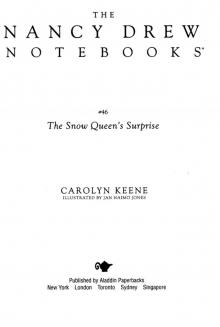 The Snow Queen's Surprise
The Snow Queen's Surprise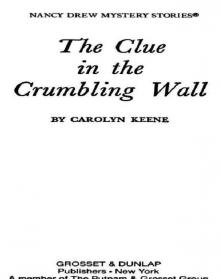 The Clue in the Crumbling Wall
The Clue in the Crumbling Wall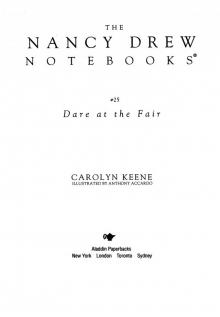 Dare at the Fair
Dare at the Fair Scream for Ice Cream
Scream for Ice Cream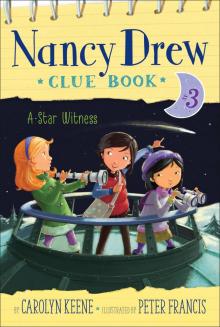 A Star Witness
A Star Witness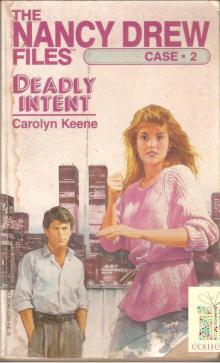 002 Deadly Intent
002 Deadly Intent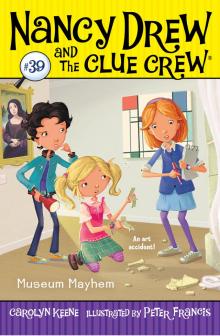 Museum Mayhem
Museum Mayhem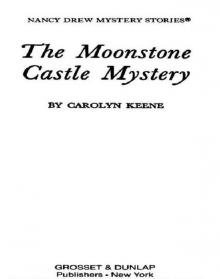 The Moonstone Castle Mystery
The Moonstone Castle Mystery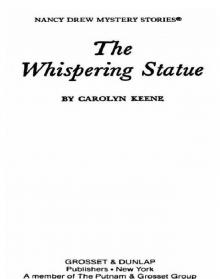 The Whispering Statue
The Whispering Statue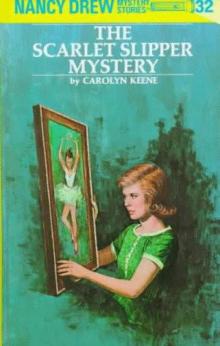 The Scarlet Slipper Mystery
The Scarlet Slipper Mystery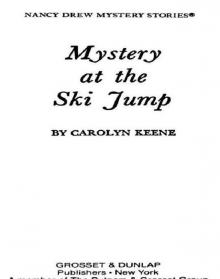 Mystery at the Ski Jump
Mystery at the Ski Jump Hot Pursuit
Hot Pursuit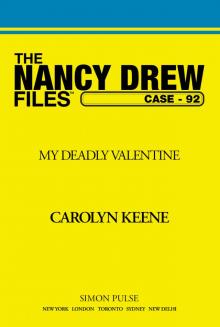 My Deadly Valentine
My Deadly Valentine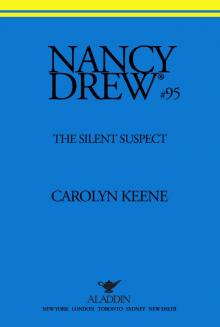 The Silent Suspect
The Silent Suspect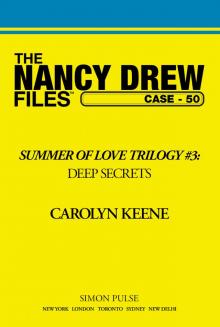 Deep Secrets
Deep Secrets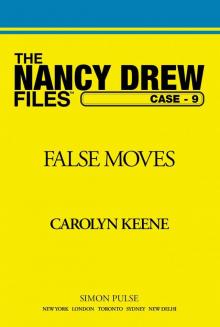 False Moves
False Moves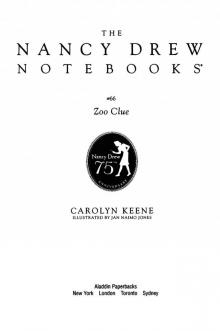 The Zoo Crew
The Zoo Crew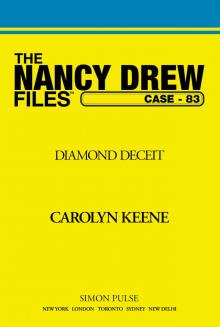 Diamond Deceit
Diamond Deceit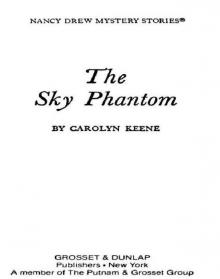 The Sky Phantom
The Sky Phantom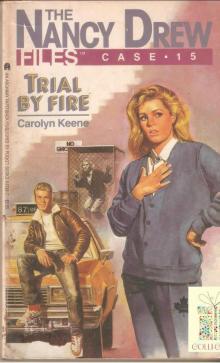 015 Trial by Fire
015 Trial by Fire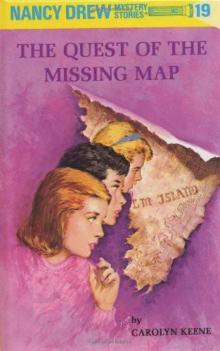 The Quest of the Missing Map
The Quest of the Missing Map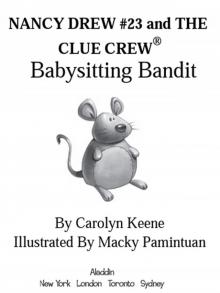 Babysitting Bandit
Babysitting Bandit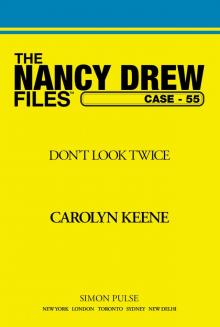 Don't Look Twice
Don't Look Twice Never Say Die
Never Say Die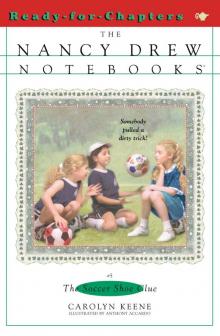 The Soccer Shoe Clue
The Soccer Shoe Clue Pool Party Puzzler
Pool Party Puzzler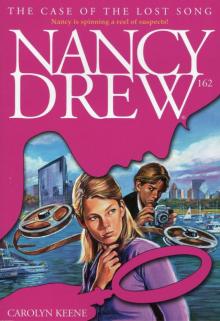 The Case of the Lost Song
The Case of the Lost Song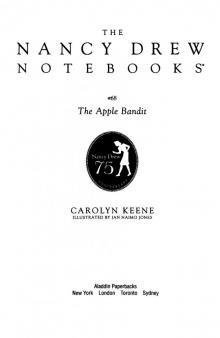 The Apple Bandit
The Apple Bandit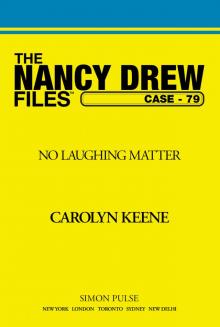 No Laughing Matter
No Laughing Matter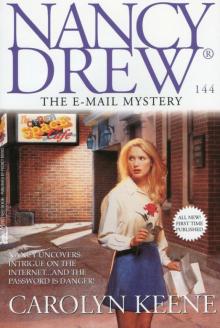 The Thirteenth Pearl
The Thirteenth Pearl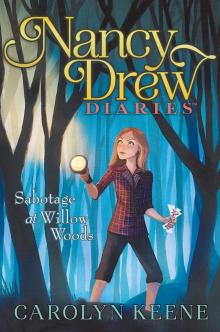 Sabotage at Willow Woods
Sabotage at Willow Woods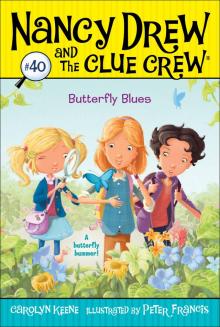 Butterfly Blues
Butterfly Blues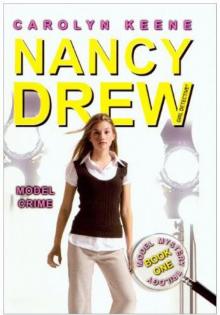 Model Crime 1
Model Crime 1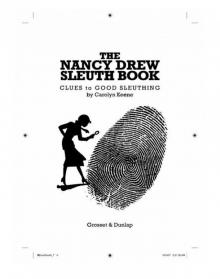 The Nancy Drew Sleuth Book
The Nancy Drew Sleuth Book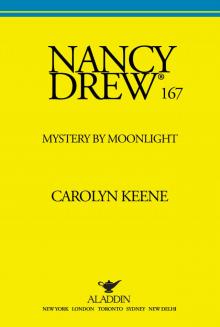 Mystery by Moonlight
Mystery by Moonlight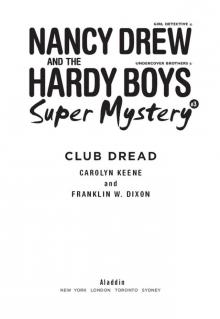 Club Dread
Club Dread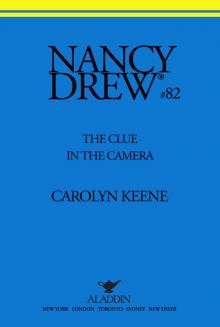 The Clue in the Camera
The Clue in the Camera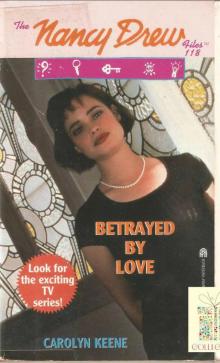 118 Betrayed By Love
118 Betrayed By Love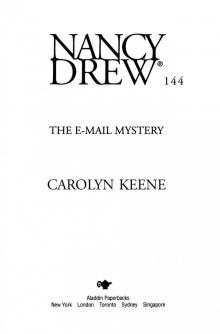 The E-Mail Mystery (Nancy Drew Book 144)
The E-Mail Mystery (Nancy Drew Book 144)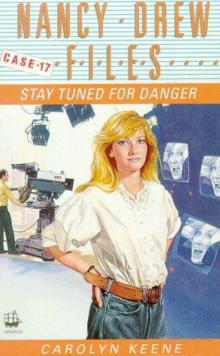 Stay Tuned for Danger: Circle of Evil
Stay Tuned for Danger: Circle of Evil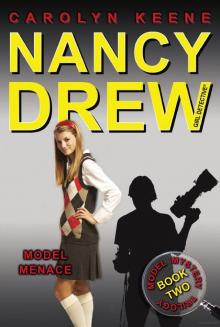 Model Menace 2
Model Menace 2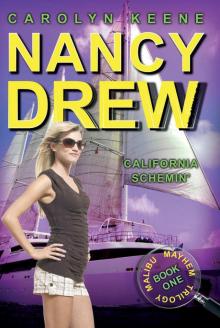 California Schemin': Book One in the Malibu Mayhem Trilogy
California Schemin': Book One in the Malibu Mayhem Trilogy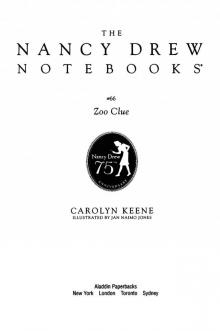 Zoo Clue (Nancy Drew Notebooks)
Zoo Clue (Nancy Drew Notebooks)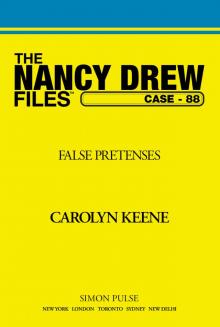 False Pretences
False Pretences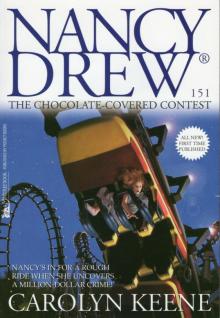 151 The Chocolate-Covered Contest
151 The Chocolate-Covered Contest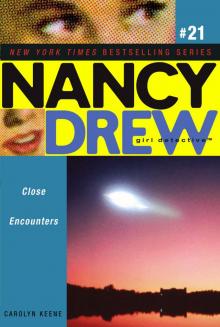 Close Encounters
Close Encounters The Emeral-Eyed Cat Mystery
The Emeral-Eyed Cat Mystery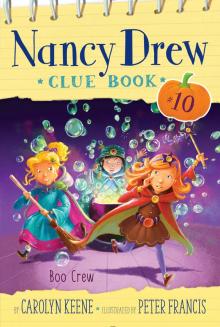 Boo Crew
Boo Crew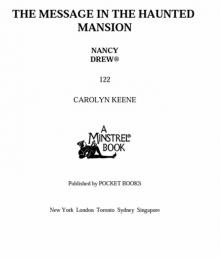 The Message in the Haunted Mansion (Nancy Drew Book 122)
The Message in the Haunted Mansion (Nancy Drew Book 122)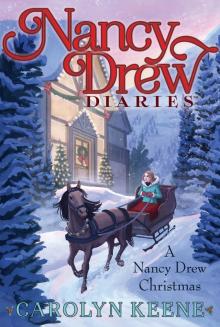 A Nancy Drew Christmas
A Nancy Drew Christmas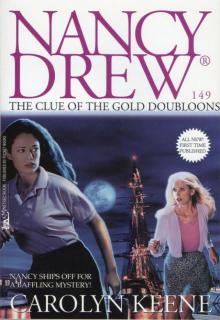 149 The Clue Of The Gold Doubloons
149 The Clue Of The Gold Doubloons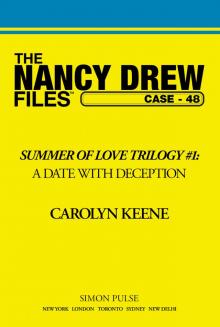 A Date with Deception
A Date with Deception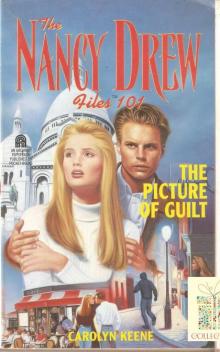 101 The Picture of Guilt
101 The Picture of Guilt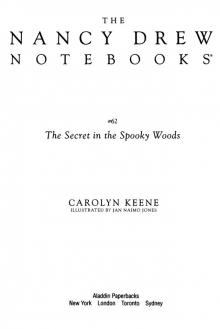 The Secret in the Spooky Woods (Nancy Drew Notebooks Book 62)
The Secret in the Spooky Woods (Nancy Drew Notebooks Book 62)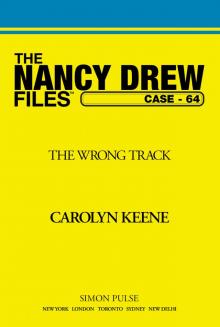 The Wrong Track
The Wrong Track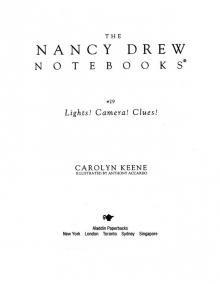 Lights! Camera! Clues!
Lights! Camera! Clues!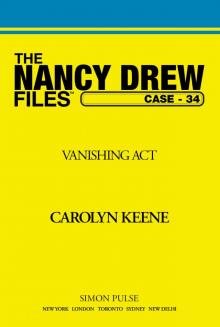 The Vanishing Act
The Vanishing Act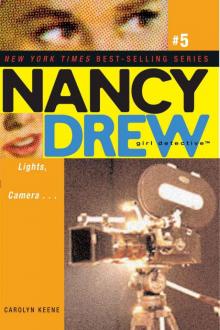 Lights, Camera . . .
Lights, Camera . . .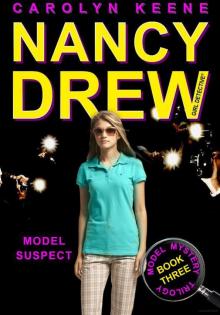 Model Suspect 3
Model Suspect 3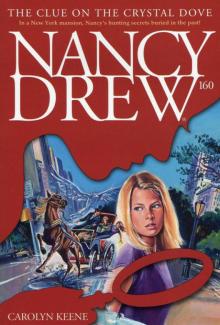 160 The Clue On The Crystal Dove
160 The Clue On The Crystal Dove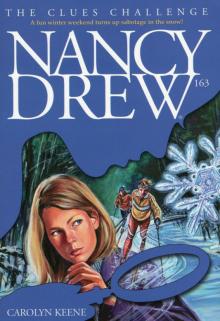 163 The Clues Challenge
163 The Clues Challenge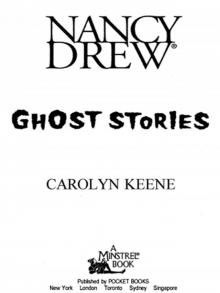 Ghost Stories (Nancy Drew)
Ghost Stories (Nancy Drew)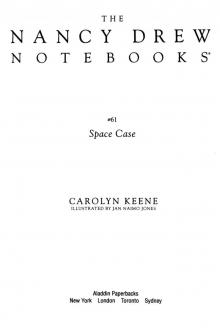 Space Case (Nancy Drew Notebooks Book 61)
Space Case (Nancy Drew Notebooks Book 61)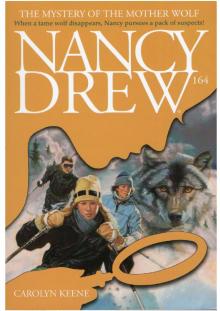 164 The Mystery Of The Mother Wolf
164 The Mystery Of The Mother Wolf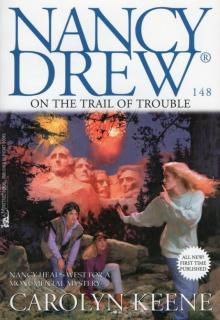 148 On The Trail Of Trouble
148 On The Trail Of Trouble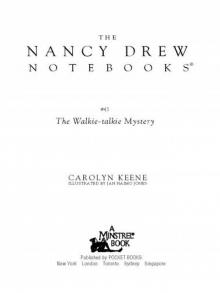 The Walkie-Talkie Mystery
The Walkie-Talkie Mystery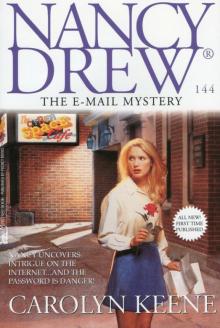 The E-Mail Mystery
The E-Mail Mystery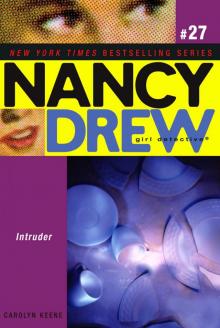 Intruder (Nancy Drew (All New) Girl Detective)
Intruder (Nancy Drew (All New) Girl Detective)![The Stolen Relic [Nancy Drew Girl Detective 007] Read online](http://i1.bookreadfree.com/i2/04/11/the_stolen_relic_nancy_drew_girl_detective_007_preview.jpg) The Stolen Relic [Nancy Drew Girl Detective 007]
The Stolen Relic [Nancy Drew Girl Detective 007]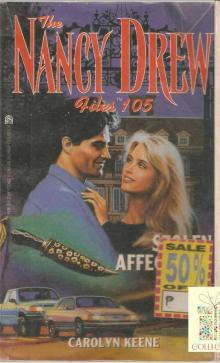 105 Stolen Affections
105 Stolen Affections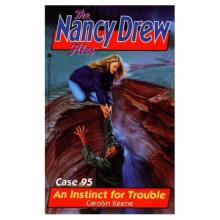 An Instict for Trouble
An Instict for Trouble 161 Lost In The Everglades
161 Lost In The Everglades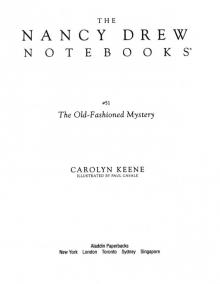 The Old-Fashioned Mystery
The Old-Fashioned Mystery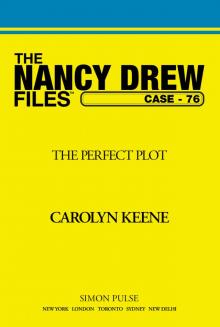 Perfect Plot
Perfect Plot